#But why are they looking like the pilgrims in the 1600s
Text
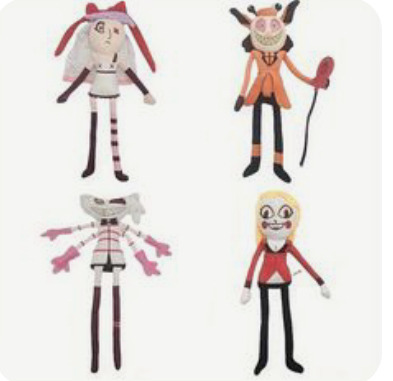
everyone go home, these are the canon designs now
#Why are vaggie and Alastor so PALE#Like I know they’re grey or whatever in the show#But why are they looking like the pilgrims in the 1600s#hazbin hotel#Looking at this now I realize these are the pilot designs but still#Don’t even get me started on the hair holy fuck#And charlie’s face proportions#I should be working on my fics rn but this was more important atm
2 notes
·
View notes
Text
retrocognition - xavier thorpe
masterlist
requested: yes!
requests: open!
I love your writing so much! If you have the time could you please do a xavier x reader where him and the reader don’t really get along at all, kinda enemies! And the reader is a witch and she is having difficulty doing a spell but then Xavier comes in and bothers her and somehow she accidentally casts a spell that makes them go into the future. in the future her and xavier are like married with kids and they both are kinda freaking out over seeing their future selves and when they get back to the past Xavier is trying to deny what they just saw but they eventually end up together?
A/N: this idea is so super cute <33 i hope you like it :) they dont quite end up together just yet, especially because they were enemies before and this is only one small fic, but i do hope you enjoy reading! <3
wordcount: 2,772
warnings: she/her reader, incorrect information about witchcraft, xavier annoys reader
Xavier Thorpe and you do not get along. Then why is it that he is in your future?

"Here you are!"
You thank Thornhill before stepping into the empty classroom. The bag on your shoulders is heavy as it is filled with countless jars of ingredients, incense, candles and different types of water. To top it all off, it had a thick book filled with all the spells and sigils you know.
There was a history test coming up, and you thought of the perfect way to learn from it; seeing the past.
Sure, it might be a bit extreme, but if you have the power to do it, you might as well use that to your advantage. From what you know, you have everything to perform the spell.
No one else was going to enter the classroom any time soon, so you could use all the tables to put your stuff down. Jar after jar, candle after candle came out of your bag before it neatly got placed in its own spot. For a spell this hard, you needed all the space and organization you could get.
You had performed this spell once before, but it had been a while. The last time, you only went backward a week. You only wanted to know at what time you were going to meet your friend later that day.
Now you were going to try to go back to the 1600s to learn about Joseph Crackstone. Sure, the entire city knew of the history, but none of them have truly lived it. Pilgrim World is just a poor excuse for trying to remake it while selling fudge. You are not a Crackstone fan considering he would have killed you back in those days, but he wouldn't be able to see you in the past anyway.
With the spells that you performed, you turned invisible when being in a place where you shouldn't be. It is like watching a movie. You see them, yet they don't see you. You open your journal, flipping through the pages before seeing the one you need. It had a sigil on it already, one connected to the Retrocognition spell.
Just as you light your first candle, the door swings open. You look up, slightly annoyed. Did Thornhill rent the room out to another student?
"You're here?"
Out of all students, it had to be Xavier.
For some reason, the two of you never got along. Not because you didn't want to befriend him - no. He just decided to be a complete ass to you since the beginning. The two of you were in the same friend group, yet he never spoke a positive word to you. It would always be something snarky or negative.
"Yeah?" You raise an eyebrow. "Thornhill told me that I could use it. It was going to be empty the entire day anyway."
"I was allowed to use it for my Botany homework."
"Xavier," you groan. "Just use the other half of the classroom. Just... Stay out of my way. I have a History test that I need to learn for."
He circles your table as you only keep setting things up. You can't have him messing up your spell. More candles get lit as you crush up some flowers and herbs.
"Is this your homework?" He lets out a laugh. "I wish my homework consisted of scribbles and some seasoning."
You roll your eyes as you place each ingredient in its designated spot. If he messes up your spell, you will kill him.
"It's not just some scribbles. They're called sigils, dumbass," a sigh leaves your lips. "And they are for history class. There is a test coming up."
Another laugh leaves Xavier as he flips through your journal.
"How are some pen marks and rose leaves going to teach you History?"
"Xavier, we both know you're too dumb to understand this. Just go to the other side of the classroom and don't bother me."
The last thing you needed was the journal. You had to place it in the circle of candles, drawing the sigil while saying the incantation. But, considering the tall boy had your book, you couldn't get the spell started. He is flipping through the pages with a big grin on his face.
"Oh, look at me!"
He takes hold of some rose petals, sprinkling them around on the table and the floor.
"I am Y/N," he lets out a laugh before grabbing more ingredients, spilling them on the table.
"Xavier, stop it! You're messing with my spells!"
"That's not true," he takes hold of your hand before pushing a pen into it. "I am merely helping with your 'oh so important' History homework!"
He takes your hand to write on the paper, making random shapes and lines.
"Look! I could be a witch, this is easy."
"Xavier! Stop being so annoying!"
You take the pen off of the paper as Xavier's hand still holds yours, but to your surprise, the paper actually starts glowing. No way that he had activated a spell.
"Retrocognition?"
A bright light exploded in the room, making you shield your eyes with your hand. Xavier also lets out a yelp, what the fuck happened?
When the light dims, you finally open your eyes again.
"Where the fuck are we?"
In front of you is a house. A beautiful one, but certainly not one from the 1600s. Music can be heard from inside, together with some talking and you even hear a meow.
Someone walks past you, carrying a bag on their shoulders. He is tall and his hair flows to his shoulders. The man is not that old, though older than you and Xavier now. A smile is on his face as he walks up to the house.
"Wait a second," you let out a giggle. "Is that you?"
Xavier walks up to the guy as you follow him. It certainly was. His face looks almost the same, yet a bit more mature. It is like he is looking in a mirror, one that shows him his future.
"You look old," you laugh, elbowing the artist.
"Shut up," he rolls his eyes. "What happened with that stupid spell that you were trying to cast?"
"Someone happened to fuck it up," you narrow your eyes at him before nodding to the door. "I'm going to see what your old ass is up to."
Future Xavier unlocks the door, allowing you and Present Xavier to slip inside. Not that they would see you anyway. The music gets a bit louder as you hear some movement from what seems to be the kitchen.
"Love? I'm home!"
"Aw," you look at Present Xavier, trying to hold in your laughter. "Someone is dumb enough to be stuck with you. That's sweet."
"You jealous?" Xavier raises an eyebrow as he looks down at you. "At least I know that I won't be alone in the future."
You roll your eyes, slowly following Future Xavier around.
"Look! He is even wearing a wedding ring!"
The house truly is beautiful. It is filled with plants in different corners, a cozy couch, a big kitchen, and huge windows. If you didn't know any better, then you would surely have said that this is your dream house.
"I'm in here!"
Your eyebrows furrow when you hear the new voice. It is strangely similar, but... it can't be, right? Xavier catches up to you, not fully sure what to do. He has never been in a spell like this before. Hell, he didn't even know any spells. Sure, he would say 'open sesame' when trying to unlock his door if his hands were full, but the door never swung open.
You stop in your tracks when your eyes fall on the new figure.
In the kitchen is a shorter girl, one looking exactly like you. Her height, her body language, her voice, and her face. What are you doing here with Xavier? A high-pitched laughter can be heard as Future Xavier hurries to the table, dropping his bag before picking up a small girl.
"There's my favorite girls!"
Future you also has a ring on her finger, one that fits together with Future Xavier. Present Xavier stops walking as he takes in the three figures.
There he is. Holding a young girl with one arm while the other is resting on your shoulders, pulling you into him as Future you lets out a giggle.
"What the fuck?" Xavier whispers.
It was weird enough to see himself in the future, even if he didn't change too much. But it is even weirder to see himself together with you, and with a child. You are also frozen in place, your eyes fixated on the three figures in front of you. What type of spell is this? Is this actually real? Or is this only your imagination playing tricks on you? Surely not. If Xavier can see it, then it must actually be happening, right?
"I'm getting out of this," Xavier groans, turning around to walk back out of the front door before his eyes fall on an item.
On the wall hangs a big canvas with a very specific scene on it. Future him in a neat, black suit. Next to him stands Future you, dressed in a long gown. Both have big smiles on their faces. His fingers twitch, did he paint that? The picture almost seems to move in front of him as the figures get closer and closer, sharing a soft and loving kiss before returning to their original positions.
"Y/N, get us out of here!"
Xavier is confused and even slightly scared. You break your stare as you look over to the tall artist. With only a nod, you take his hands in yours, whispering an incantation to break whatever spell you were in right now.
Another bright light makes you close your eyes as you return to the Nevermore classroom. Xavier pulls his hands out of yours harshly.
"What was that!?"
"I don't know!" You let out a deep sigh.
Your journal had stopped glowing, only pen stripes from whatever sigil Xavier had come up with are left on the page. You run your fingers over it, confused as you try to read off of the pages.
"It's precognition," you let out a whisper. "We were supposed to see the past, but instead... it was the future."
Xavier lets out a short laugh before shaking his head.
"Whatever that was is not my future."
He slings his bag back on his shoulders, glaring at you as he backs up.
"We will never talk about this. Ever."
You weren't in the mood anymore to try any other spell. Instead, you just cleaned up the mess of flower petals and herbs before retreating to your dorm.
-
The spell had really messed you up.
After that dreaded day, you had tried multiple times to find out what happened. To find out if it was true. But no matter which color of candle you used, or what type of incantation, they all gave you the same answer.
This was your future.
Xavier Thorpe.
You tried to talk to him, maybe if you did, you could avoid the future that he seems to hate so much. Sure, Xavier wasn't your best friend either, but at least you don't despise him as much as he despises you. He is pretty and mesmerizing, but the way he treated you was just the worst.
He would sit on the opposite side of the table during lunch breaks, and would completely ignore you before, during, or after classes.
"Xavier looks even angrier than usual," Ajax snickers. "What did you do this time?"
You roll your eyes as you read through your journal. Is there really not any other Truth or Future spell out there?
"Absolutely nothing," you shrug. "Maybe he is in one of his moods."
"I don't know," the Gorgon chews on the end of his pencil. "He's been really moody this past week."
You don't really respond. What are you supposed to say? 'Oh, he found out that he and I are married in the future and he absolutely hates it.' That sounds incredibly stupid. Even if it is true.
-
Later that night you sat in your dorm yet again. Around you is a circle of candles in all sorts of colors, their flames the only source of light. It feels like you have read every single page of all your Witchcraft books at least five times, yet you still haven't found any spells to help you out. There has to be something that can show you a different future, right?
A knock on your door pulls you out of your focused state. Who would be at your door right now? You don't have a dorm mate, and from what you knew, most of your friends were out to Jericho. You stand up from your seat, walking up to the door to open it. Behind it stands Xavier with a tired look in his eyes and his sketchbook in his hands.
"Can I come in?" He mumbles softly, looking down at you with the softest look he has ever given you.
You step to the side, allowing the artist to enter your room. He stays silent. No snarky comment, nothing mean. Just silence.
"Have you found anything else?"
The only answer you give him is a shake of your head. You had really tried. Xavier his reaction during the spell was enough - he didn't want this future. At least, not with you.
"Can we try again?"
His question shocks you. He wants to enter the spell again? Go through more scenarios of the two of you together?
"Are you sure?"
He nods, placing his sketchbook onto your bed before stepping into the circle. You just quickly follow him, opening the page of scribbles that Xavier had drawn before. His hands are already reaching for yours when you speak the incantation.
Another bright light.
This time, you aren't in front of the house. Instead, you appeared in it, already. There is no furniture around you. No curtains, no couch, no table, not even a wooden floor.
"I can't believe this!"
Future you squeals as she runs around the house, inspecting every room once more.
"Look! This one can be your art studio, and then the room next to it can be for my spells and potions!"
The woman pulls Future Xavier with her, holding his hand tightly as she spits out different ideas for the space.
Present Xavier swallows thickly, his hands balled up into fists.
"Are you okay?" You whisper, looking up at his taller figure.
"I have seen this before."
How would he have seen this before? He knows nothing of witchcraft - the spell he performed before was just a simple accident. The spell ends quite quickly, returning to just you and Xavier in the middle of your bedroom. It stays quiet. The only movement comes from the lit candles whose flames are moving in the non-existing wind.
"Why did you want to see it again?" You softly speak up. "You hate the outcome. It didn't change one bit."
The boy shakes his head, reaching for his sketchbook before flipping through the pages, stopping at one specific drawing which seems familiar.
"I haven't been able to sleep this entire week," he admits. "I had these dreams. Dreams that felt like the one spell. I drew all of them."
He holds his hand up on the page, the figure of you pulling Xavier with you before disappearing behind one of the pencil lines. You can almost hear your excited chattering and Xavier's laughter. But that is not the only thing he drew.
Different dates, your wedding, even sketches from the little girl.
Everything was exactly as the spell had told you.
"I convinced myself for so long," he mumbles. "I tried to tell myself that I didn't like you. That, if I ignored you, you would stay out of my way. But I don't want to do that anymore."
You let out a giggle, looking up at him.
"Alright," you whisper. "We can start over?"
Xavier looks at you, a relieved look on his face as he nods. Though the future scared him, he now does truly want it. He felt like he didn't deserve a future with you after how he treated you. But, he might change his mind. He might be able to change himself and make up for all the times he wished he could hold you, kiss you, be with you.
"Yeah," he nods with a smile before he holds out his hand. "Xavier Thorpe. Nice to meet you."
#xavier thorpe#xavier thorpe imagine#xavier thorpe x reader#xavier thorpe oneshot#wednesday imagine#wednesday oneshot
193 notes
·
View notes
Text
ive been up since around 5:30.. i forgot what my dream was about. sniffling and coughing like a sick little pilgrim boy from the 1600s… i should stay home. i mean, id like to stay home.. but i also simultaneously don’t want to cause i have some little things id like to talk about. also because i have a meeting with my guidance counselor at 8 but thats not really why
im not sure if i have anything else to put here.. oh, right! this is internally (plus likely externally) what i look like when i see my friends too. very happy! very joyous and jumping for joy! :3

although i am a sick little dog i am still happy and excited… yippee!
1 note
·
View note
Text
[“While people from England, Spain, Portugal, France, Scotland, Sweden, and Holland had all colonized parts of America by the late 1600s, it was the English who controlled nearly all the colonized territories in what would become the United States in 1776.
The 1500s and 1600s in England were anything but gentle times. People were routinely burned at the stake for heresy, a practice that began in the twelfth century and continued through 1612. Torture was an official instrument of the English government until 1640. The famous Tower of London was, in part, a huge torture chamber. One of many torture devices in the Tower, the rack, was used to stretch human bodies and pull them apart. Here is a description of the apparatus at work:
This caused terrible pain for the victim as well as increasing physical damage as the torture continued. Tendons were ripped, joints separated and bones fractured. The sounds of muscles and tendons tearing and snapping provided audible signs of the damage being done.
During much of the Middle Ages in England, torture wasn’t just wildly popular; it was a spectator sport. In his essay “Violence and the Law in Medieval England,” historian Sean McGlynn puts it this way:
Throughout the whole medieval period there was popular demand for malefactors to receive punishment that was both harsh and purposefully terrifying. This reflected people’s enthusiasm and the desire to see justice being done. There was even an executions transfer market: bids were made to stage the executions of condemned men in front of home crowds…. Mutilations sent out a message of warning and deterrence; executions offered the ultimate guarantee against repeat offenders … with few prisons and no police force, severe punishment was deemed invaluable as a deterrent to crime.
In her book A Distant Mirror, Barbara Tuchman offers this parallel description of everyday life in medieval England:
The tortures and punishments of civil justice customarily cut off hands and ears, racked, burned, flayed, and pulled apart people’s bodies. In everyday life, passers-by saw some criminal flogged with a knotted rope or chained upright in an iron collar. They passed corpses hanging on the gibbet and decapitated heads and quartered bodies impaled on stakes on the city walls.
It is not hard to understand why so many people from England fled to the American colonies. (Fleeing is, of course, a survival response.) Many of the English who colonized America had been brutalized, or had witnessed great brutality first-hand. Others were the children and grandchildren of people who had experienced such savagery in England.
Barbarism was not the only reason to flee England. The Great Plague raged through much of the country in 1665 and 1666, killing an estimated 100,000 people in London alone—almost a quarter of the city’s population. In the village of Eyam, the Plague killed four out of five residents over fourteen months. Many English immigrants were desperately trying to get away from poverty, starvation, and overcrowding.
For all their talk of the new Jerusalem, the Pilgrims and Puritans were not explorers. They were refugees fleeing imprisonment, torture, and mutilation. In England, one Puritan writer, William Prynne, had his ears cut off and his forehead branded (burned with a red-hot iron) with the letters SL, which stood for seditious libeler. Another Puritan, John Lilburne, was flogged with a whip, dragged by an oxcart through London, and forced into a pillory. Others had their noses split or their tongues bored with hot irons.
In Post Traumatic Slave Syndrome, DeGruy asks, “Isn’t it likely that many slaves were severely traumatized? Furthermore, did the trauma and the effects of such horrific abuse end with the abolition of slavery?” We need to ask these same questions about the English colonists who made their way to America. Isn’t it likely that many of them were traumatized by the time they arrived here? Did over ten centuries of medieval brutality, which was inflicted on white bodies by other white bodies, begin to look like culture? Did this intergenerational trauma and its effects end with European immigrants’ arrival in the New World?”]
Resmaa Menakem, My Grandmother’s Hands: Racialized Trauma and Healing our Hearts and Bodies
#resmaa menakem#history stuff#and that’s where nancy isenberg’s book comes into it#you had shipment after shipment of Waste People dumped off on the coast#street scrapings and convicts and children and whores with no agricultural or survivalist skills#told to farm or die#so they cannibalized each other#the puritans had the church and each other but they were surrounded by Waste People with ties to nothing#finding ever more inventive ways to cannibalize each other for centuries
157 notes
·
View notes
Text
Escape From Halloweentown {Jack Skellington x Reader} CHAPTER 1
Summary: When a game of hide-and-seek goes wrong, you find yourself lost in the woods without a way home. Whether it be fate, or just dumb luck, you suddenly find yourself in a far bigger predicament than you ever thought you would be- and it’s not just because you can’t seem to find your little brother.
**Pairing: **Reader / Jack Skellington. A very slow burn fic.
NOTE: This is a full-length fanfic! If you don’t want to read chapter by chapter on tumblr, please use the following links to read in a different format / on a different website!
Wattpad | Quotev | AO3
Fic Below the Cut | Previous Chapter | Next Chapter
You had thought the doors in the trees lead to a cozy, hollow trunk, or even just a black-filled void of some solid decorative substance. Of course, once you found yourself launched onto the ground in front of you, sprawled out after trying and failing to break your fall, you quickly came to realize that that obviously was not the case.
You grunted, wheezing in the air you’d just had knocked out of you. Once you managed to scramble to your feet, you brushed yourself off, picking the pebbles and other woodland debris from your stinging palms and knees. The inflicted areas burned, and you idly ran your fingertips over the little divots they’d made into your skin before you turned around to face the door. Or rather, doors.
They still were attached to the circle of trees you’d found in the beginning, all towering over you by miles as they stood stoic and unmoving as trees always are. Out of both a burning curiosity and an insatiable impulse, you reached forward toward the gleaming knob to twist it, yet it was as stiff as a board. You furrowed a brow, trying yet again, but it didn’t move.
It didn’t move.
You looked beyond the massive trunk in front of you and out toward the horizon, where the sun had just started to come up. The entirety of the sky was painted a fruitful orange, and despite the beauty of the picture, you were more confused than you’d ever been before. The sun, as warmth-emanating as it was, sat there, climbing in a direction opposite of where it had just been moments before.
You blinked. And then you blinked again.
And then you squeezed your eyes shut and clenched your fists, digging the ends of your nails into your palms to ground you with some semblance of pain.
It was almost too easy to convince yourself that everything you’d just experienced was, in fact, a dream- yet still you found yourself trying your hardest to cling to the façade. It definitely seemed more real than the reality that was currently right in front of your closed eyes in the moment.
You sighed, and when the sun didn’t revert back to the other side of you, and the doorknob still didn’t turn, you gave up.
You turned on your heel, tentatively at first, but then started to walk away. You didn't know where you would end up, but using this newfound daylight for something other than trying to convince yourself you were crazy is the best you could do. You crunched browned leaves under your shoes, their steady rhythm keeping you going.
Crunch crunch crunch crunch…
You breathed in and out to the beat of your own footfalls, so lost in the monotony that you didn't even realize there had been a dirt path bare of grass and leaves before you. You'd been so focused on figuring out what had just happened that the transition into silence didn't even faze you, so when you finally did notice you were actually heading somewhere, you were surprised.
Your pace quickened, excitement coursing through your veins. Maybe there was a town nearby, or at the very least, someone's backyard. As long as you had somewhere to go, you could make it work.
The trees started to thin, as did the grass and underbrush that had surrounded you nearly the entirety of your journey. The forest itself pushed back, and ahead you could make out gnarled buildings that curled and rose toward the grey sky. Although the architecture was odd, especially by modern standards, you couldn't help but smile. It was a town! There had to be people here that could help you, and if you were lucky enough, maybe you’d find someone who’d seen your brother.
The clouds fogged the distant towers, making it seem so far away. You didn’t let that deter you, however; you passed the opening in the trees and met a dull graveyard with twisted tombstones and gnarled wording carved into them. You furrowed a brow and stopped for a moment, taking in the sight before you. These stones were surely unlike any you’ve ever seen, the lettering curling in such a way that you couldn’t make out what it said other than the dates in which these people had died: 1743, 1820, 1789, 1650, etc, etc.
Your eyebrows raised and mouth parted to breath, surprise etched in your features. You didn’t live in the north, where the pilgrims settled and died as early as the 1600s, and you didn’t know of anywhere around that could remotely match these dates of death. It was astounding to you that there had been people living here during that time- and then your shock turned to wonderment. The headstones all had one thing in common, aside from the material they were made of; none of the dates had passed the mid-1900s. Where were you? And what kind of town looks like this, with old buildings and outdated graveyards?
Shaking off the oddness of the situation, you left the line of tombs, only glancing back a couple times to make sure that you’d seen the dates correctly. You trudged on until the blackened iron fence that enclosed the rest of the graveyard came into view, the gate pointed and an unmistakable jack-o-lantern etched into it’s bars. It was propped open, it’s bottom hinge broken and the butt of the gate sunk into the dirt. From the path, you could see stones, and eventually a cobble route that was indistinguishable from the stone archway and wall that closed in the uncanny town in all its glory.
The alleyways were mostly empty, save for an occasional statue you mistook as a person. There was no litter among the lines of houses; just empty trash cans, rusting bars on windows, and locked doors to accompany the already peculiar feeling of the place. In the distance, the crashing waves of the somehow-running fountain gave some life to the town center. This, of course, was one of your only indications that there were people here at all; why would the fountain be running if there wasn’t anyone to manage it? Everything was clean, too- so this place must be a town of hermits, with outdated traditions and their own ancestors in their graves.
You sighed, and noticed the sun still creeping over the horizon. It hadn’t taken you long at all to get here, and usually that would be a good thing, but now that you were perched on the fountain’s edge looking at the vastly differing houses around you, you weren’t so sure that this place would be of any help. If anything, you were scared. You very plainly not even a full-fledged adult yet, but here you were, in the middle of God knows where looking for your little brother where he didn’t seem to be.
Tears pricked at your eyes, and you instinctively sniffed to get rid of the stinging sensation. You were here for your brother, and no one else. That meant that, despite the scary situation, you would go door to door and ask for help if you had to. There were no ifs, ands, or buts about it.
All the houses here were menacing in their own way, so, as you did when you chose a direction to walk in, you just turned toward a house and decided to walk toward it. You breathed in and made your way to this particular house’s stairs, stepping up one to plant three loud knocks on the front of a surprisingly sturdy wooden door.
You stared at the outside of the building. The windows didn’t have bars, like the others; instead, there were rotting boards covering the openings. The more that you looked at the exterior, the more you realized that there would be no way for any semblance of light to creep in, which made you raise an eyebrow in question. A moment more passed, and you knocked again, growing impatient with this empty village. Right as your knuckles brushed against the door for the third time, it swung open, revealing the dark interior and a tall, thin man clad in black standing before you.
“Yes?”
His voice was high, but it fell and rose as though it were a teen greeting her friend in a sing-songy way. You gave him a once-over, realizing that not only was this man inhabiting a house that could be compared to an abandoned lot, but he was also dressed as a vampire… in the middle of November.
“Uh, I was looking for my brother. Have you seen him?”
He had to squint to see you against the light of the outside, but even so you could tell he was looking you up and down. Though you had no idea what was going through his mind, you could tell that he was probably just as confused as you.
When he didn’t reply, you decided to elaborate; “We were playing in the forest, and he got lost. I don’t know if he ended up here, but could I at least use your phone? To tell my dad I’m safe. Mine’s dead, I can’t reach him.” You stopped yourself before you continued to ramble on, biting your tongue and hoping he could help you.
He didn’t say anything at first, and you thought that he might not respond at all. You opened your mouth to speak once more and the door closed in your face. You had no time to be shocked before it opened once more, creaking on its ancient hinges. He stepped back and gestured behind him, his cape draped over his arm as if he were Count Dracula.
You bowed your head and thanked him as you stepped into the very dimly lit room, the only source of light coming from an old lamp that sat in the corner of the room, which seemed to be nearly burnt out. You glanced about and saw that it wasn’t just this man’s costume that was vampire themed…
His décor was littered with Victorian era styles, a large coffin in the corner next to the lamp, slightly larger than the lopsided grandfather clock that sat next to it. It didn’t seem to be running, but you wouldn’t be able to tell even if it was. Wary, you seated yourself on the edge of the couch, hands folded in your lap as you watched the vampire-enthusiast close the door gently and look at you. Your eyes took a moment or so to adjust, but once they did, you realized that the interior of this place was nearly as dreary as the rest of the town.
“So, what did you want again, dear?”
You cleared your throat, nervousness coursing through you. “To use your phone, if that’s alright.”
He cocked a brow and glanced to the side, thinking before he responded in a hushed tone; “Let me see if I have one to use… just give me a moment.”
He was gone, around the corner and down what you thought was a hallway- it was too dark to really see anything, but you figured since he lived in this house, he had memorized its layout perfectly. You sighed, twiddling your thumbs as you waited, still thinking about the man’s obsession with the popularized blood-sucking creature.
He returned, floating across his carpeted floor with no phone in hand. Trailing behind him were two shorter figures, both dressed the same as he was with long black capes and an equally dark robe. You couldn’t tell if they were related, or just friends, but they all seemed to have one thing in common; the idolization of the vampire. This, of course, worried you some. What if they were to try and suck your blood? Or maybe they were some sort of killer posse? If that were the case, though, then surely this town wouldn’t be as empty as it was. Surely, you thought, they’d already have done something to me by now.
The tallest one- the one which had answered the door for you- informed you that these were, indeed, his brothers. They were both shorter than he, albeit heavier and wider. You smiled half-heartedly as a greeting and looked back to the original.
“So, did you find a phone?”
“A phone? What’s that, Prince?” One of the brothers drawled, his voice as old and scratchy as the other’s.
“Well, no, I didn’t. But I know someone who can.” He elected to ignore the previous question and instead followed it up with a request from the other two; “Go get Jack. He’ll know what to do.”
With a curt nod, the brothers practically floated out of the front door, arms over their heads as a classic vampire would most likely do to shield themselves from the sunlight. The tallest stayed- Prince, he had been called. He didn’t sit down, as you were, nor did he really move from his standing place.. The silence in the room settled, thick and heavy, until you were so fed up with it that you decided you had to speak to preserve your own sanity.
“Uh, I like this room. It looks very nice- it’s really unique.” You smiled a thin-lipped smile and looked to him, gauging his reaction. He had already been staring at you- you chalked it up to him having not had guests in a long while. He nodded, not smiling when he responded; “I like it too.”
You didn’t like the tension, nor did you enjoy just sitting around, however you needed a phone. Or at the very least, someone more capable of getting you one than Prince. Summoning all your patience, you waited.
You were lucky that you didn’t have to wait very much longer. You’d been bouncing your leg and fiddling with the dead skin on your fingers the entire time, and you didn’t want to seem too nervous or scared. You had a feeling that it might’ve been rolling off you in waves, so you tried your best to stifle the urges.
Your ears perked up after a minute or so more, alerted to a crunching sound outside of the door. Both you and Prince looked at it before it was pushed open by the shortest brother, who bumbled inside ungracefully, followed by his other similarly dressed family member. You looked passed him, expecting another vampire, or maybe even a normal human person, but what stood in the archway was so much more than what you were expecting.
It was a skeleton.
#anauthore#tnbc#the nightmare before christmas#fanfiction#fanfic#fanfiction on tumblr#tnbc fanfiction#the nightmare before christmas fanfiction#chapter 2#escape from halloweentown#lost in halloweentown
125 notes
·
View notes
Text
Mewman settler headcanon and Theory
Ok, everyone is asking the questions about Mewman Settlers since Daron doesn’t give them the actual answer.
Question 1. Are Mewman Human?
well, I can tell by their appearances

they look more resemble of humans and their skin are pretty natural but if you say “why there’s African man doing in pilgrim settler, shouldn’t he be dressed in rag.? Well, there was a African pilgrim. Don’t believe me, here‘s the link
https://www.google.com/amp/s/www.washingtonpost.com/news/retropolis/wp/2017/11/21/at-thanksgiving-the-search-for-a-black-pilgrim-among-plymouths-settlers/%3foutputType=amp
you can’t say they’re from 1980’s re-enactment settler journey or otherwise, Star would have enter the futuristic earth when her birthplace was modern medieval fantasy dimension. I think they come from in early 1600’s when they want to get out the England. Also, there’s a dark skinned female pilgrim and that like maybe she didn’t want to be a slave like other dark skinned people cuz white people hate dark skinned people (sorry if this sound prejudice but that the past).
Question 2. Who is the First Queen of Mewni and what is she like?
Here’s the Headcanon or real reason, Ceresa (I decide to name that girl with rosy cheek since Daron never mentioned the name of the first queen) was just a bratty teenage girl who doesn’t like change such as having future coming and the old ones move out. She always complained about why everything in reality is always ugly and why can’t it be like fairytale with knight and kingdom. when the time come after the settler came to the new world (before called America), Ceresa take the few settlers with her so they can find new place. on the way on journey in the boat, they stumbled upon the portal well they thought it fill with gold. they fall themselves into the realms of magic where they lose all their memories and forgot who they are (Still, they didn’t even jump out of the boat). before exiting out realms of magic, Ceresa spotted a small spark in the gold water as she grabbed it and created a millhorse (remember when Glossaryck created the wand by using baby rattle and making millhorse. well, that wand was made by him but Ceresa creating millhorse by dipping down the gold water). Ceresa and her people arrive at Mewni without memories and found a giant stump to have a shelter and before that, Glossaryck gave her wand as a first queen of mewni because she had created millhorse and also she has cheekmark. Ceresa felt so happier that now she‘s now the queen, She can rule the Mewni and stay in monarchy just like the fairytale.
Question 3. If female mewman has mewberty, why we didn’t see them exposed magic?
That's the good question. Do we see non-magic female mewman having mewberty on screen? No (unless if you use wand, get cheek marks, & exposed magic, you‘ll have mewberty). I only saw Star, Moon, Solaria, Eclipsa, & Meteora mewberty but I never every female mewman having mewberty. What make me think is the butterfly that get mewberty when they exposed magic. I think female mewman just might have regular puberty.
Question 4. Is Solaria’s responsibility for Monster Massacre or was the First Queen of Mewni‘s responsibility for Monster Massacre?
Well, it was Ceresa that start the monster massacre before Solaria start way much monster massacre. You want to know why, it because of the fairytale and propaganda they heard it about how monsters are always evil. When they first meet the monsters, they started to freak out as the first queen shoot it with her wand. First time killing the monster, She felt so powerful but worry her people are not strong enough so she turned the simple peasant into fearsome warrior (known as the pre-solarian) and like Star said and then there was fighting everyday until the monster retreat or dead. That lead the generation to kill all the monsters on Mewni.
Question 5. Why are they obsessing with corns? Don’t they have other foods?
There are different foods in Mewni. The only reason why they are so obsessed corns is that different food are mostly monster foods. They don’t want to taste monster food because they believe it was a bad omen (it wasn’t a bad omen).
#star butterfly vs the forces of evil#mewman#headcanon#conspiracy theory#the first queen of mewni#text post
6 notes
·
View notes
Text
So Thankful
For my dear friend Ay: I don’t think I followed the prompt all that well and I definitely had ideas that didn’t make it into it because I knew what I wanted to write, but then I forgot them... so this is what we’re working with. I hope you enjoy dear friend!
Thanksgiving was always chaotic in the house of the queens. The first year that they were back was quite confusing to all of them.
“Hey Lina?” Jane beckoned the first queen over to where she was standing at the calendar.
“What’s up Jane?”
“Do you know what Thanksgiving is?” She pointed at the word written across that day.
“Oh! I do!” Anne bounced in from the living room. “So, it started when America became colonized in the 1600s by Britain. The pilgrims had a feast. Well, a while later, Lincoln, America’s 16th president, declared it a day. In 1789, the congress passed it as a national holiday that is celebrated every November on the fourth Thursday. It’s a day where families get together and eat. They typically go around the table before their meals and ask what everyone is thankful for. To me, it’s kind of silly that that’s what the holiday has come down to considering the rich history of it, but-”
“We’re celebrating it. We all have so much to be thankful for, and we need to recognize it.”
“Cool. I’ll tell the others.” Anne ran upstairs, her small footsteps sounding like a herd of elephants as she called for the others.
“Wait! Anne!” Jane called. “What are we supposed to eat?”
“Turkey! Stuffing! Cornbread! Corn! Vegetables! Mashed potatoes! Mac n Cheese! But not the boxed kind- homemade. You know, that kind of stuff. And dessert! Pies! Pumpkin pie, apple pie, pecan pie! All the dessert!”
Catherine glanced at Jane in confusion.
“I guess when she says she reads, she’s really not lying,” Jane offered with a shrug of her shoulders.
-
And so, here the queens were, a few years later. Not only had they kept up on their tradition of having a Thanksgiving feast, but this year, they had new additions to the meal.
“So, if you’d like, you’re more than welcome to come over for Thanksgiving. I know Becky, Dawn and Ogie are in town too, and they’re more than welcome to join! The more the merrier!” Jane smiled into the phone.
“Oh girl, that’d be great. I’ll bring the pies for dessert. What time do you guys normally start eating?”
“We try to have everything set on the table by 3, but you know how that can be. So, it’s usually all done around 5. But you guys are more than welcome to come over at any time that day!”
“Great! And Lu is always more than welcome to come hang out while we do all this stuff if you want her out of your hair.”
“I’m sure she’ll be delighted to hear that,” Jenna couldn’t help but stifle a laugh.
-
Thanksgiving day had come, and the queens house was nothing if not chaotic.
“Anne Boleyn, out of my kitchen!” Jane had screeched for the thousandth time that day. All she was trying to do at this point was make the stuffing with her youngest cousin.
“Janey, I’m just trying to-”
“I know you’re trying to help, and I really appreciate it, but you can’t keep opening and closing the oven door or the turkey is never going to be done! Why don’t you go help Anna?” Anne nodded and bounced down to the basement where they had set up a make-shift kitchen for the fourth queen.
“Hey Jane?” Kat said slowly.
“What?” the blonde hissed, a bit more bark in her voice than she would have liked.
“I cut myself.” The pink haired queen displayed her finger.
“Go clean yourself up. I’m pretty sure Aragon is done with the vegetables for now, so I’ll see if she can help with the stuffing.” Jane put her head in her hands. Of course this would happen. It wasn’t a holiday if Kat didn’t accidentally cut her finger trying to slice bread.
The fifth queen nodded and walked upstairs, only to have her body in the kitchen replaced with the golden queen’s.
“How ever did I expect this to happen?” Catherine grinned, rubbing a hand on Jane’s shoulder on her way to Kat’s station. She grabbed a new knife and continued on with the bread cutting. “Relax Jane. It’s all going to be okay. And think of it this way: Jenna’s in charge of dessert this year, so that’s one less thing you have to worry about.”
“You’re right, but with the-” Jane counted in her head. “-six extra mouths to feed, we have to really up our game and make double what we usually make. And Jenna’s pregnant.”
“Hey, you know Dawn and Lu eat like birds. Together, they make up one of our mouths.” The doorbell rang. “Speaking of, there’s Lu now.” The two motherly queens walked to the door, and peaked their heads out.
“What’s the password?” Jane allowed herself to be silly for a moment.
“Aunt Janey! And Lina!” Lulu bounced from her spot on her mother’s hip. She squirmed to be let down, eliciting a giggle from the two women in the house.
“She’s been up and begging to come over since five this morning.”
“I was up anyway. Tried to start on the turkey before Hurricane Anne was awake, but she came bouncing down five minutes later. We would’ve let her come.”
“See Mama? I told you Aunt Janey would’ve been up!”
“Come on in little Lu! We’ve got your apron all ready for you, and I’m sure Annie will be so excited to hear that you’re finally here! She’s been asking about you all morning.” What Jane had said wasn’t far from the truth. Questions about when their little friend would join them began at approximately eight in the morning.
“Be good for your girls!” the baker called out to her daughter who was already bouncing down the queens’ steps to the basement.
“She always is. How are the pies coming along?” Catherine made conversation with the woman.
“Dawn, Becky, and I made 'em up last night. Told the boys they were in charge of putting them in the oven, so they should be almost done!”
“Great. Did you want to come in and have a glass of wine or something?”
“I’d love to, but I promised the idiots at home I’d only be a few minutes. And, I don't entirely trust Ogie and Jim not to burn down my kitchen. I know Becky and Dawn-” Jenna laughed as she remembered the time Becky almost set their diner on fire. “-well, Dawn, could handle it, but not without having a full blown panic attack.”
“I’ve got you. Sounds like you have a couple hurricanes at your house right now.”
“That I do. But now, you’ve got... all of your hurricanes and my little hurricane.”
“She’s never a problem Jenna. I promise you, we all love having her around.”
“If she gets to be too much, let me know and I’ll swing by and grab her until dinner.”
“Appreciate it, but you won’t need to. See you at four?”
“See you at four,” the baker affirmed.
-
“Lulu Pomatter!” the blonde called to the basement, already a bit tense after the antics that morning.
“What Aunt Janey? I’m trying to help Anna decide how much cheese to put on the mac n’ cheese! And the potatoes!”
“Hun, you just need your apron.”
“Oh!” Lulu ran up the steps and allowed Jane to help her into the clothing.
“Your mama wouldn't be too happy if I returned you with food all over you knowing you have a perfectly good apron here, now would she?” the third queen muttered as she tied the piece of cloth around the little girl.
“Thank you!” the girl with pigtails squeezed her surrogate aunt and pressed a sloppy kiss to her cheek before running back downstairs to help Anna and-
“Annie! Stop eating the macaroni!”
“Oh good god,” Jane muttered to herself as she and the first queen continued to cut bread.
-
“Is the turkey almost done?” Anne made her way up the steps with Lulu on her hip.
“No, it’s not. And if you don't want Jane yelling at you again, I suggest you get yourself out of the kitchen,” Aragon responded, not looking up from the book she was reading.
“But I just want to see if-” the green queen cracked the oven door open slightly.
“Anne Boleyn! Close that oven door right now!” Jane’s voice could be heard from the bathroom.
“How did she know?” Lulu whispered, confused. The silver queen wasn’t in the kitchen.
“I swear, she’s got a sixth sense. Maybe she should’ve gone down in history as a witch, not me.” Aragon let out a snort- she wasn’t expecting that to come out of her successor’s mouth.
-
“Aunt Janey?” Lulu watched as the third queen flitted around the kitchen, setting out various dishes on the table.
“What’s up love?” Jane slowed down just a bit to get a look at the sweet girl in front of her. Her heart pained a little, feeling the absence of her son who she so dearly wished was celebrating this holiday with them.
“Could I help set the table?”
“Of course honey! You know where all of the silverware is.” Jane nodded in the direction of the drawer anyway.
-
“Aunt Janey?”
“Yes dear?” Jane didn't turn around from the gravy she was whisking, but she made sure to let the girl know she was listening.
“Where’s Cathy?”
“Oh, I think she’s up in her room writing some. Do you want to go see her?”
“Can I?”
“I’m sure she would love the company. And maybe, you can pry her away from her work for a little bit.”
“Do you think she might want to read my book with me? I got it at the library! It’s about Thanksgiving!”
“Why don’t we go ask her?” Jane motioned for the girl to follow her up the steps and knocked on the writer’s door.
“Yeah?” Cathy called.
“You’ve got a little munchkin wanting to visit. Think you could tear yourself away from that screen for a-”
“Cath! It’s me! It’s Lulu! Can I come in?”
The door swung open almost instantly. “If I had known you were here, I would’ve come down!” The little girl made grabbing hands towards the queen dressed in blue.
-
“Hey Lu? Cath?” Jane was standing at the door she had been in front of an hour before. “Dinner’s almost ready. Do you guys want to-”
“Aunt Janey! Look!” The door whizzed open, revealing Lulu, Cathy, Anne, Anna, and Kat all in paper hats covered in glitter, no doubt supplied by the fifth queen.
“We made you, Lina, Mama, Daddy, Dawn, Becky, and Ogie hats too! And Cathy wrote a play for us to all put on after dinner!”
-
“Hi!” Lulu opened the door for her family, sparkling hat on top of her head.
“Hey guys,” Jane nodded as she opened the door wider for the group to come in, a paper hat with silver sparkles covering much of her blonde hair.
“Holy moly!” Anne came sprinting over, seeing the three pies that Jenna was balancing along with the two pies in Jim’s hand and one that Dawn was holding. “How many pies did you make?”
“A shit ton,” Becky laughed.
“So you’re Becky?” Anne grinned, knowing that the bold woman was indeed Becky. The queens had heard enough stories to know which woman was which.
“You’re damn right I’m Becky. And Dawn here, she’s the quietest of us all. Get a couple drinks in ‘er though and-”
“Becky!” Dawn gasped.
“Alright girls, that’s enough for now,” Jenna ordered in her “mom tone”, as the two waitresses liked to call it.
“Lu, are you forgetting to give them their hats?” Catalina, the woman with such regality, had a paper hat decorated with gold sparkles.
“Oh yeah! So, while Aunt Janey and Lina were finishing up with dinner, me and the rest of my girls-”
“The girls and me,” Jim corrected gently.
“-Gosh Daddy. The rest of my girls and me,” she moaned unceremoniously. “Made hats for everyone! Like the pilgrims! And Kat had sparkles and glitter, so we decorated them! Annie told me they all had colors assigned to them for the show they were in, so they kept their colors! Lina is gold, Annie is green, Aunt Janey is silver, Anna is red, Kat is pink of course, and Cathy is dark blue! I made you three-” she handed the women their hats. “-light blue because of the uniforms at my diner. Daddy is black glitter, and Ogie too.” She handed the men their hats.
-
“Alright guys, what are we all thankful for?” Jane looked at the group expectantly.
“Isn’t it right that you start Janey?” Anne looked at her.
“I guess. Okay, well I’m thankful for the roof over our heads, and the food that is about to
be in my stomach. I’m thankful that Anne hasn’t burned the house down yet. And, I’m thankful for all of you. You're the best family that I’ve got. Thank you for helping get this dinner together, and for overall just always being there for me when I need it. Okay, who’s next?”
-
“Good god, I’m so full,” Anne remarked as she unbuttoned her pants.
“Must you do that every year?” Catherine didn’t even try to stop herself from rolling her eyes.
“I hope you’re not too full, because I brought six pies.”
“Which ones?” Anne’s eyes lit up.
-
“Good god, I’m so full,” Anne yawned. “I don't know how you do it Jenna, but all of those pies were amazing.” The second queen had, in fact, helped herself to a slice of each and every pie the baker had brought.
-
Jane and Jenna had the littlest girl laying across their laps. Jim was happy to sit on the couch arm, an arm wrapped around his wife. Anne was curled into Jane’s other side, happy to be small enough to fit on the couch next to Katherine. Aragon was sitting in her recliner, Cathy perched on one couch arm, and Anna was more than happy to lay on the floor, blanket draped over her. Ogie and Dawn found their positions sitting in front of the couch, Becky above them. The hats had been carefully laid down on the kitchen table to be put away for next year.
They had cleaned up and were now watching a movie the little girl requested, but as she fell asleep, the adults began to chat and reminisce.
“I can’t believe we’re lucky enough to spend this holiday all together,” Jenna smiled. “For a long time, Thanksgiving was just Becky, Dawn, and me. But this- this is really great.”
“It’s only gotten better because you decided to join in on the chaos this year.” Jane nudged the baker. “Thank you again for the pies by the way. I’m sure they’ll be gone before the weekend because of someone.” She cast a knowing glance at the green queen curled up into her side.
“So, here’s a weird question for you,” Dawn giggle, a few glasses of wine in. “What’s the best thing that you didn’t have in the 1500s?”
“Comfortable chairs,” Catalina smiled. How she hated sitting in that uncomfortable throne for the twenty-four years she was queen.
“Shoes with wheels in them,” Anne laughed, knowing the third queen would groan.
“Comfortable clothing. I hated those stupid ass corsets we had to wear. I couldn’t work out in them!” Cleves threw in.
“Phones. I love having all of the music in the world in my hand,” Kat added without looking up from her phone.
“Computers. It was so hard physically writing everything down then. Now, if I make a mistake, I can just press the backspace.”
“Jane? You’re awful quiet.” The room’s attention turned towards the blonde, who looked up with tears in her eyes.
“The best thing that I didn’t have in the 1500s was you guys. I’m so thankful for each and every one of you.”
#six the musical#six musical#six the musical fanfic#six the musical fanfiction#six fanfic#six fanfiction#six musical fanfic#waitress the musical#waitress musical#waitress the musical fanfiction
18 notes
·
View notes
Text
Rock A Bye Baby Lyrics

Lullaby Lyrics: Rock-a-bye, baby On the treetop When the wind blows The cradle will rock If the bough breaks The cradle will fall But mama will catch you Cradle and all Baby is drowsing Cozy and fair Mother sits near In her rocking chair Forward and back The cradle she swings And though baby sleeps He hears what she sings Hush a bye baby Up in. To the tune of 'Rock-a-Bye Baby'. Actions are in blue! Rock-a-bye Moses in your small boat Rock pretend baby. Cup hands like boat. Made by your mother so it would float. Make wave motions with hands God planned you special, a baby dear.- Point up Rocking and sleeping without any fear. Rest head on hands. Rock-a-bye Moses in your small boat. Rock a bye baby, on the tree top, When the wind blows the cradle will rock. When the bough breaks the cradle will fall, And down will come baby, cradle and all. Rock-A-Bye Baby DESCRIPTION: The nursery rhyme: 'Rock-a-bye baby on the tree top, When the wind blows, the cradle will rock.' Folk versions often add more.
Rock A Bye Baby Lyrics And Music
Rock A Bye Baby Lyrics Pop Song
Rock A Bye Baby Lyrics Meaning
Shutterstock
Ah, 'Rock-a-bye Baby.' The most classic nursery rhyme of all time. After all, nothing lulls a cute, innocent little baby to sleep like everyone's favorite tune about reckless infant endangerment gone awry, right?
Now, nursery rhymes often have surprisingly violent lyrics, but if 'Rock-a-bye Baby' is to be believed, not only is somebody climbing up trees and sticking their babies on the highest branches, but they're also watching as the cradle drops, and then writing songs about it. It's utterly bizarre, and while 'Rock-a-bye Baby' will probably permanently remain embedded in pop culture (after all, it works), the exact origins of this song aren't easily pinpointed.
Rock-a-bye Baby might've been inspired by a woman who lived in a tree
If you're hoping to figure out the name and address of the person who first wrote this somewhat creepy song ... well, good luck with that time machine. First of all, the oldest known appearance of this rhyme in print (originally named 'Hush-a-bye Baby') occurred in the 1765 publication of Mother Goose's Melody, in London, according to the McFarland Historical Society. It seemingly wasn't until the 1800s where this little poem gained its official melody, which then thoroughly embedded itself in American culture.
The source of inspiration for this rhyme is, unfortunately, unclear. Perhaps the most prominent theory, according to Country Images Magazine, is that the rhyme goes back to a 1700s woman named Betty Kenny, who lived in the U.K.'s Shining Cliff Woods with her husband, Luke, and eight children. Betty and Luke used a 2000-year-old yew tree as their home, creating a hut beneath the tree's branches and using its massive trunk to support the house. This structure must've certainly looked quite fairy tale-esque, and many believe that she lulled her eight babies to sleep by placing them in the tree's massive, hollowed out branches. Now, that's certainly far safer than the lullaby sounds, though it's easy to see why it could've amazed people enough to write a rhyme about it.
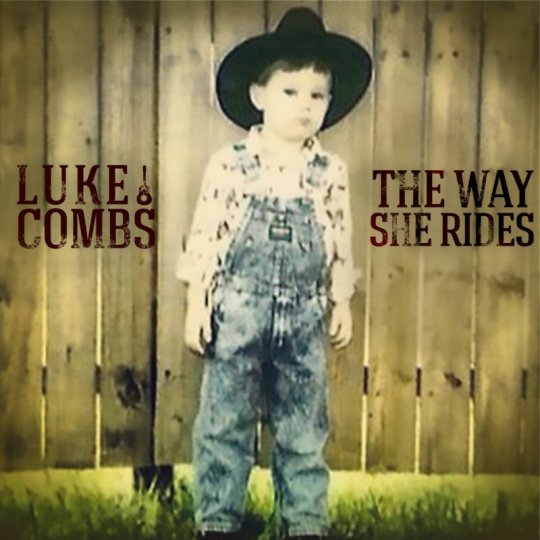
Many other possible 'Rock-a-bye Baby' origin stories exist
There are several other theories regarding the song's origins, as Wonderopolis points out. Some believe it may be an allegory for the political resentment of certain English-folk in the 1600s, who were fearful of King James II's conversion to Catholicism, and may have hoped that his infant son would die (I.E., falling from a treetop) and lead to a Protestant king taking over. Dark stuff, for a dark rhyme, but perhaps a bit too convoluted to be the true story.
Alternatively, some people theorize that the nursery rhyme originated with the pilgrims, who were astonished by the unique, fascinating cradleboards used by some Native American women. These cradles kept their babies snug, safe, and upright. Many women would carry these cradles either on their backs or by hand, but when they needed to put the babies down for a moment, according to the Museum of the Red River, the cradleboards could be hung from a tree.
The Nursery Rhymes Collections 1-4 contain a total of 277 children's songs. Each double CD album showcases the highest quality children's music ever recorded with a total playing time in excess of 10 hours!
Rock-a-Bye Baby (Full Audio and Lyrics)
Rock-a-bye baby,
On the treetop
When the wind blows,
The cradle will rock
When the bough breaks,
The cradle will fall
And down will come baby
Cradle and all.
Words & Music: Traditional
Arrangement: Ian J Watts/Mike Wilbury
Origin and background
Historian and linguist Andres Ehmann wrote an essay about historical nursery rhymes that are directly or indirectly related to Kings and Queens of the Stuart and Tudor families: Rock the Kings!
By means of these truly historical nursery rhymes he explains the meaning and the fascinating stories of English Kings and Queens throughout the centuries
Table of contents (chronological order)
1. Humpty Dumpty - Defeat of Charles I, King of England and Scotland
2. Georgie Porgie - Charles II defeated by Oliver Cromwell
3. Three Blind Mice - Queen Mary and the prosecution of English Protestants
4. Rock-A-Bye-Baby - From Charles II to James II
5. Jack And Jill - The French Revolution
6. Sing A Song Of Sixpence - King Henry VIII
Rock A Bye Baby Lyrics And Music
7. Mary Mary Quite Contrary - 'Bloody Mary', Queen Mary I
8. Skye Boat Song - The escape of Charles Edward Stuart
9. Bonnie Banks O' Loch Lomond - The last battle of the House of Stuart
History, origin and meaning of Rock-a-Bye-Baby
Well! This nursery rhyme contains a real philosophical question, maybe one of the most important questions in philosophy. The question is: Do words matter? You can read everywhere (and there is no doubt that the nursery rhyme is used in this way), that this song is a lullaby, used to help little children to fall asleep. It would seem, however, that neither the baby / little child or the adult singing the song is really aware of what they are hearing / singing. Concerning the baby or the little child, that’s not very surprising. If they are young, words like treetop, bough or cradle would have no meaning for them. Concerning the adult the situation is more complicated. He or she understands exactly what the song is about. We see very clearly that very often the best communication is not to have any communication at all. Sometimes it is much more fun to look at someone while he or she is talking - looking at his or her face, to the emotions expressed by the movement of his or her hands or to his or her smile -without paying any attention to what she or he is actually saying. That’s what a baby does. A baby doesn’t really care what the words are about, or if they mean something or not. For a baby, words are just a melody. Perhaps there is a deep truth in the song, never revealed until known, words are misleading, far away from the melody of life and it is all about emotions. Because, if the baby understood what mummy, daddy, aunt, grandmother or whoever was singing, she or he would be SHOCKED. The song is about a cradle, rocking on a tree top. In order to fasten a cradle there, the treetop must be a certain size and therefore the tree must be a certain high, at least 5 meters. If the bough breaks, it must be a certain thickness, it must be a strong tree, otherwise it would just bend. We can therefore assume that the baby would fall at least 5 meters. If the baby really understood what the song was about, it is unlikely that he or she would have sweet dreams. A nightmare would be more probable! But all of that is no problem at all and the idea that this song could be a problem if used as a lullaby arises from the completely misleading conception of language. People think (nobody knows why), that words refer to something in the real world, that they MEAN something, although it is obvious that words means nothing, they just create emotions or energy. People die for instance for their fatherland, for a religion or for a flag because they are pushed by the energy of a word, but in fact a word for a human being plays the same role as petrol for a car.
We are going to discuss that topic once again when we talk about the song Bonnie Banks O' Loch Lomond. Therefore, we can say that this song is good illustration what words actually are. At the beginning, when they show up or are used for the first time in history, they have a meaning, but after that, they are just a box where people put their emotions and ideas (often very strange ones). When the word “love“ for instance showed up for the first time in history, it had a meaning, but then it becomes a box where people put in everything they believed bore a relationship to the word. We can therefore assume that a long, long time ago this song had a meaning. From a historical point of view we can’t say that words don‘t have any meaning. There must be a meaning! Let’s have a look at the songtext.
Rock-a-bye baby, on the treetop
When the wind blows, the cradle will rock
When the bough breaks, the cradle will fall
And down will come baby, cradle and all
The description is somehow abstract, but nevertheless there is a lot of information. The baby is in a very high, but insecure position. This position is endangered, because there is a risk that a wind may start blowing, which will rock the cradle with the baby and break the bough the cradle is attached to, so that the cradle will fall down from the top. The most important information is at the end. Not only the baby and the cradle will fall, but ‘all‘. What is ‘all‘?
There are some theories to explain the meaning of the song which can be easily exluded. The idea that the song was written by an english immigrant who saw the native american women rocking their babies in a cradle attached to the branches of a tree is absurd. It is well possible that these women rocked their babies that way, but not at the top of a tree and not if the wind blows so strong that there is a risk that the branch the cradle is attached to will break. It is much more likely, given the abstract but detailed information in the song, that the song refers to a concrete historical situation.
There are three reasons to believe that this song has a relationship to The Glorious Revolution (the overthrow of James II, the last ruling Stuart King).
1) This argument is valid for all the songs with a historical background. The only alternative we have is to say that they mean nothing. But, we have already seen that words become boxes in the course of history, but when they start their lives, they have a meaning.
2) There are a lot of songs where the relationship to the house of Stuart can be easily established and there are very few songs with a historical context which doesn t refer to the house of Stuart in one way or another.
3) The abstract but detailed description fits very well with a concrete historical situation.
We have already seen in Humpty Dumpty, Georgy Porgy and Three blind mice that the 16th and 17th century is characterized by religious conflicts which overlay other interests and conflicts. When Henry VIII (1491 - 1547) declared himself head of the English Church in 1533 to marry Anne Boleyn, the catholics were persecuted. This was both financially interesting, because the expropriation of the catholics monasteries was good financial business (see the song Little Jack Horner), and the catholic church was opposed to his marriage with Anne Boleyn because his former wife, Catherine of Aragon (1485 - 1536) was still alive. After the death of Henry VIII , his son, Edward (1537 - 1553), issued from the third marriage with Jane Seymour, ascended to the throne. Until then there was only little difference between the catholic church and the anglican church, at least in the content, which is not very surprising, because theology consists of words - you can put in whatever you want. The fifteen year old Edward abolished the celibacy of priests and the use of Latin language in the mass. After his early death his half sister, the very catholic Bloody Mary, issued from the marriage between Henry VIII and Catherine of Aragon, ascended to the throne. She reversed the reforms of Edward and the catholic faith became once again the religion of the state, although not officially. The persecution of the protestants began (see the song Goosy Goosy Gander). When Mary I died, Elizabeth, her half-sister, issued from the marriage with Anne Boleyn, ascended the throne and the Anglican Church became the official Church of England, with Elizabeth it‘s head. There are no songs about the conflict between Maria Stuart and Elizabeth I, although this conflict, beside the struggle for power, was caused by religious differences too.
There are still three kings left until we get to the historical situation described in the song. Elisabeth I was followed by James I (1566 – 1625), the son of Maria Stuart. His reign is characterized by conflicts with the parliament about financial issues rather than religious problems. Now there are only two kings left, Charles I (1600 – 1649) and Charles II, until we get to James II, and his insecure son in the treetop. The relationship between Charles I and the parliament was difficult from the very beginning, for several reasons; his marriage with the catholic Henrietta Marie de Bourbon, the conflicts created because of George Villier (see the song Georgy Porgy) and riots in Scotland and Ireland, which obliged him to ask the parliament for more money. The parliament basically was in favour of the suppression of the riots in Ireland and to offer the money needed to do that, but was afraid that the power aquired through that money would be used afterwards against them. Charles I tried to eliminate Pym, the leader of the majority fraction of the parliament, an act considered as a coup d’ état and the beginning of the first civil war (1642—1645) and the second civil war (1647 – 1649) which ended with the execution of Charles I. For a short period England was a republic with Oliver Chromwell as Lord Protector (head of the state). There is only one king left, Charles II, before we arrive at James II, who was blown away by a strong wind, when baby, the cradle and all fell down. After Charles I was beheaded the problems remained unresolved and the wars against Scotland and Ireland and the suppression of the catholic faith in general made Oliver Chromwell more and more unpopular. For this reason, the English parliament elected the son of Charles I, Charles II (1630 – 1685) King of England after the death of Oliver Cromwell in 1658. We have already discussed Charles II. Perhaps he is Georgie Porgie. Although he had a very exciting, erotic life and a lot of very nice children (that’s what we assume, we suppose that they were nice) he had no “legitimate“ son or daughter. So his younger brother - yes, we have arrived at the cradle falling from the top of the tree - James II ascended the throne of England.
The Stuarts were not really what we would call a success story, but in history everything is very relative. The whole history of humanity is not really what we would call a success story, and it is only after World War II, with strong international institutions like the UN and the European Community that we can observe something that looks like intelligence in human history. The unsuccessful story of the Stuarts ends in an unsuccessful way with James II. We can really say that the baby, the cradle and all came down! Even it is hard to understand, since religion is about words, and words as we have already seen, don’t have any meaning, he stumbled once again upon the conflict between catholicism and protestantism.
But lets start from the beginning. James II (1633 – 1701), as well as his brother, was in exile in France during the rule of Oliver Cromwell, serving first in the french army in the spanish – french war (1650–1653) and then in the spanish army against France. We see therefore that he was very flexible, much better than the idiot who said “wrong or right my country“. He returned to England in 1660 when his brother, Charles II, became King of England. When his brother died in 1685 he became James II of England and James VII of Scotland. Whilst still Duke of York, a title conferred to him by his brother, he married Anne Hyde (1638 - 1671). From this marriage issued two daughters, Anne (1665 – 1714), who would become Queen of England after the death of William III in 1702, (William was the wind who made the cradle fall, as we will soon see), and Mary (1662 – 1695), who married the wind who blew away her father James II. Both Anne and Mary were protestants. James II, breaking with the tradition of most Stuarts, became a catholic, although nobody really knows why. Perhaps during his stay in France and Spain he visited too many churches instead of enjoying the delicious french fromage and vin and having fun! Some people go mad thinking too much about the “eternal questions“. In any case he not only converted to catholicism, but still worse, he made it public and under his rule the discrimantion of catholics in public life was step by step abolished, observed suspiciously by the parliament, who feared the recatholization of the nation and the influence of Spain and France. Two years after Anne Heyde died in 1671 James II married again, Mary of Modena (1658 – 1718), aged 15 at the time of her marriage in 1673. His conversion to catholicism started before this marriage, but strengthened when he married the devout catholic Mary. (The problem with youngsters becoming religious before they have the knowledge to choose in freedom exists all over the world. The author would say that this is a failure of the schooling system and should be resolved by teaching in a more professional way, the main tendencies of philosophy, Charles Popper, Ernst Bloch, Miguel de Unamuno, Voltaire etc. There is no freedom, if there is no choice. It is up to the governments to guarantee choice and freedom. All over the world, that would help to resolve many problems.) His marriage with the catholic Mary of Modena, 25 years younger than him, increased the fear of a recatholization, because Charles II, his ruling brother, had no “legitimate“ heir, therefore James would ascend the throne after his death, which is what actually happened. James‘ marriage to the catholic Mary of Modena, as well as his open conversion to catholicism, was disapproved of by Charles II, although he himself converted to catholicism before he died and lowered the restrictions imposed on catholics. After James‘ marriage to Mary of Modena a campaign was iniciated by a part of the parliament to remove him from the list of pretenders to the throne. Nevertheless, in 1685 he ascended to the throne of England and Scotland. There were several isolated attempts to remove him from the throne, but it was only in 1683 when Mary give birth to a son, James Francis Edward (1688 – 1766), the future Old Pretender, who would never ascend to the throne, although he tried to so all his life, that fears grew. With the existence of a male heir, the danger that catholicism would become the religion of the nation became an imminent danger.
Rock-a-bye baby, on the treetop
When the wind blows, the cradle will rock
When the bough breaks, the cradle will fall
And down will come baby, cradle and all.
The verse “Rock-bye baby, on the treetop / When the wind blows, the cradle will rock“ can be understood in two different ways.
1) The baby, James Francis Edward‘s whole situation was insecure. We should accept that the whole society is the tree upon which a King or any goverment relies on, and his position on the top of society, is instable. If the tree is not very strong or not willing to support him, a little wind can be enough to make him fall and in this case, not only him, but the whole house of Stuart. This is what actually happened. His father, James II, was the last ruling king from the house of the Stuarts.
2) The “legitimaty“ of the James Francis Edward was questioned by the protestants for obvious political reasons. A rumour was started that James Francis Edward was not Mary‘s child, but smuggled into her chamber in order to substitute the real, but stillborn child. If James Francis Edward was not her child, there was no legitimate heir. Therefore, the cradle was rocking on the treetop, because his very origins were questioned. It is now sure that this rumour was completely unfounded, but was used to dicredit the legitimacy of James Francis Edward as a pretender to the throne.
The birth of James Francis Edward was the last and final event which made the bough break. In the same year that James Francis Edward was born, 1688, the parliament agreed with the Prince of Orange, William III (who was married to Mary, the daughter issued from the former marriage of James II with Anne Hyde) upon an invasion of England to overthrow James II. William arrived with his troops on 5 November 1688. Most of the army officers of James II defected and James II escaped to his cousin Louis XIV of France. There is therefore no doubt, that the baby, the cradle and all fell down from the treetop. After the escape of James II, William Orange (William III) and his wife Mary, the protestant daughter of James II from his first marriage, ascended to the throne. When William III died in 1702, Anne, the second daughter issued from the marriage between James II and Anne Hyde ascended to the throne. That was not really the end of the Stuart story, we are going to hear again from them in the song Speed, Bonny Boat, but it was the end of the Stuarts as kings of England or Scotland. There is a lot of history in these simple 4 line, hey!
Finally, we can observe in this song a phenomena we see very, very often. Traditional songs are often changed, to fit with another context or use. From this song, for instance, exists another version, which describes the desperate situation of a large part of the society at the beginning of the Industrial Revolution.
Hush-a-bye baby, on the tree top,
When you grow old, your wages will stop,
When you have spent the little you made
First to the Poorhouse and then to the grave
The topic is completely different, the sardonic tone remains the same. This sardonic tone is something very typical for most traditional songs with a historical background. One might get the impression that life was too hard for sweeter emotions. Some exceptions to this rule are the Skye Boat Song and Bonnie Banks of Loch Lomond.
Rock A Bye Baby Lyrics Pop Song
previous song | next song
Rock A Bye Baby Lyrics Meaning

0 notes
Text
Day 73: Stone Circles and Charming Villages (or, the #4 Bus--It should exist.)
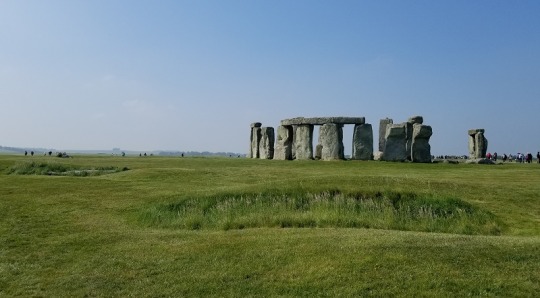
After finally getting used to sleeping in, we woke up early again for our first day-tour from Bath: a visit to Stonehenge and the Avebury stone circles as well as the preserved historic villages of Lacock and Castle Combe.
We waited again for the #4 bus outside our pub. Given the problems we’d had catching it before, we were little nervous about missing our rendezvous. We only waited for five minutes past the time when the bus should have arrived before deciding to just walk instead. We had enough time to walk if we left then, but if we waited for any longer we would have no choice but to keep waiting for the bus and hope it arrived in time.
And the traffic seemed to be, if anything, even worse than it had been when we were waiting the day before. (For such a small city, Bath has an absurd amount of traffic congestion.)
Our concern turned out to be justified--we were almost all the way to the meeting point in town before we were finally overtaken by a #4 bus going our way.
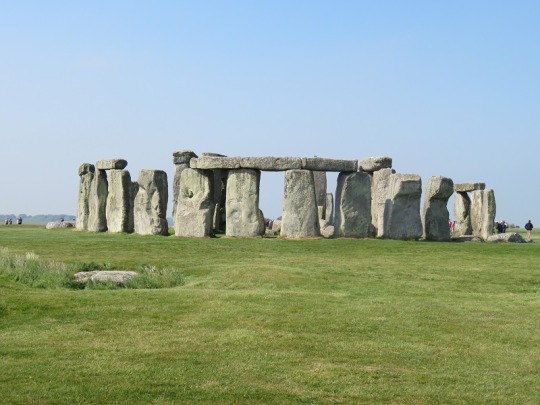
Our first stop was Stonehenge, which I found surprisingly impressive. I guess it’s like my experience with the Mona Lisa. Having mainly heard about how underwhelmed people often are by it, my expectations for Stonehenge were quite low.
Jessica also enjoyed our visit a lot. She’s been to Stonehenge before, but the last time she wasn’t able to walk all the way around it and see it from every angle.
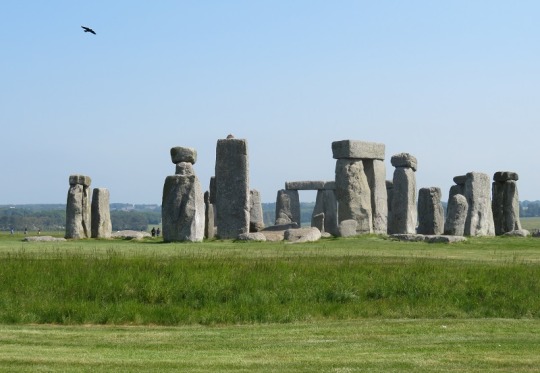
There’s very little hard knowledge about the purpose of Stonehenge or the structure of the society that constructed it, but it’s fascinating to hear on the audioguide what various archaeologists and anthropologists suspect.
It may have had something to do with death rites or ancestor worship, but there are relatively few human remains found at Stonehenge itself. But if you look around at the horizon, ancient burial mounds ring the surrounding hillsides, providing direct line of sight to Stonehenge.
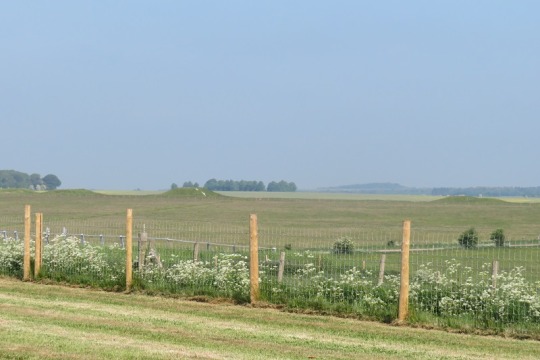
There is also archaeological proof that peopled from across Britain and even continental Europe visited Stonehenge. We just don’t know why. The society that built Stonehenge may have been prehistoric, but they were anything but primitive.
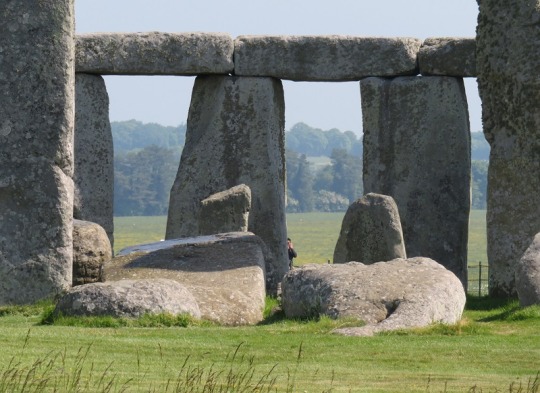
It may have been a place of magical healing. The “blue” stones in the center of Stonehenge were believed to have healing properties, and the prehistoric pilgrims may have chipped small pieces off of them to take as souvenirs. Perhaps Stonehenge was like a prehistoric version of the holy spring in Lourdes, France.

And it may not have only ever served one purpose. Stonehenge was actively used for about a thousand years after its construction, and archaeological evidence shows that it underwent a major rearrangement at least once--possibly several times.
We also learned that, contrary to popular belief, Stonehenge doesn’t actually have anything to do with the druids. Stonehenge was built, used, and abandoned long before they showed up on the scene in Britain.
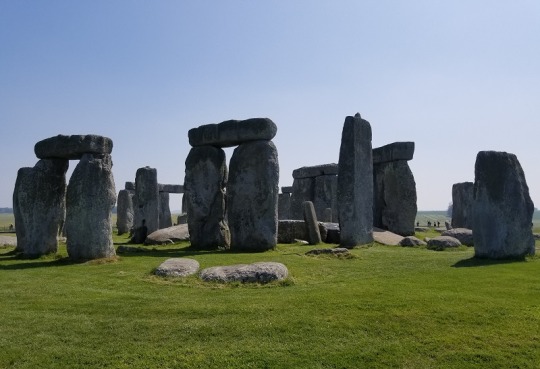
Unfortunately, we didn’t have nearly as much time there as I would have liked. We barely had enough time to use the bathroom after getting back from the stone circle, let alone even think about visiting the museum and information center. I highly enjoyed the tour, but if possible, I would recommend driving or taking the bus from Salisbury so that you can spend as much (or as little) time at Stonehenge as you like.
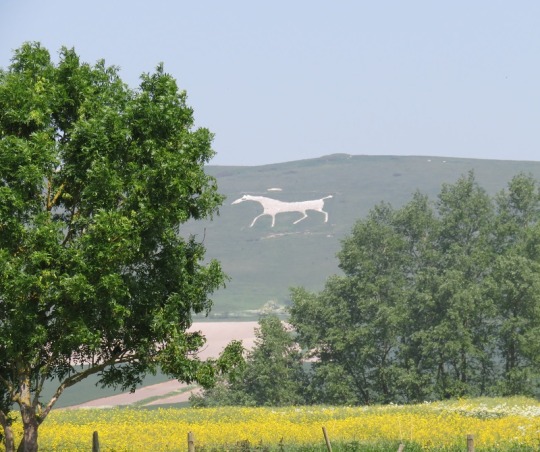
After leaving Stonehenge, we stopped for a look at one of the area’s famous white hill horses, as well as an actual white horse.
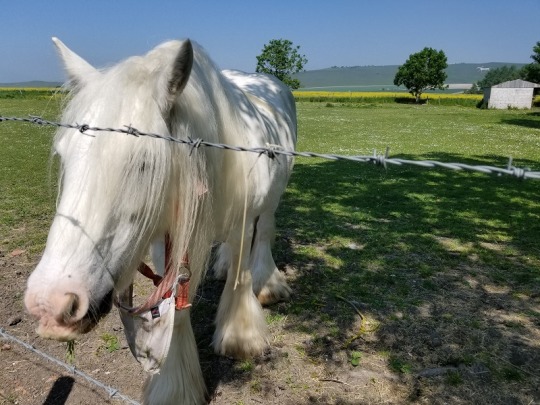
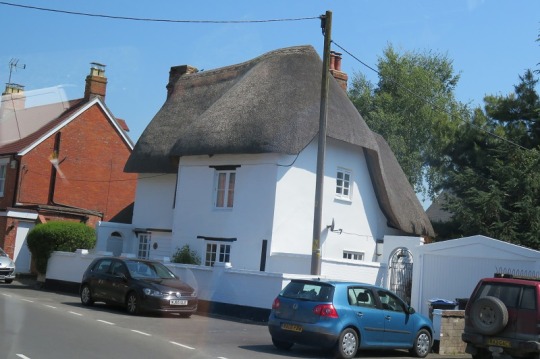
As we drove around, we saw a number of old-fashioned thatched-roof buildings. We learned that in the old days, thatchers would leave an animal-shaped makers mark on the tops of their roofs.
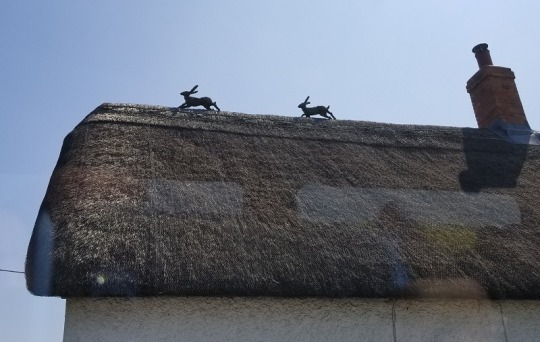
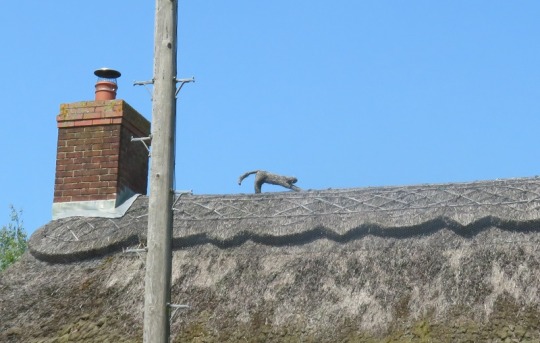
They would install the marks only after being payed, so if someone refused to pay for their roof, everyone in town would know it.
We also learned why almost all thached roofs we’ve seen are covered in a thick layer of wire mesh. Without the mesh, birds would come and steal it all for making their nests.
Next, we visited the unfortunately under-appreciated Avebury stone circles.
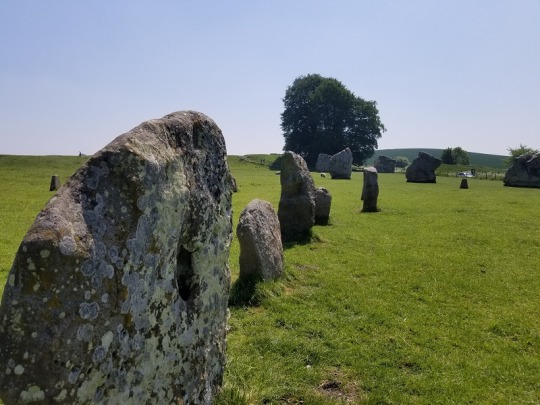
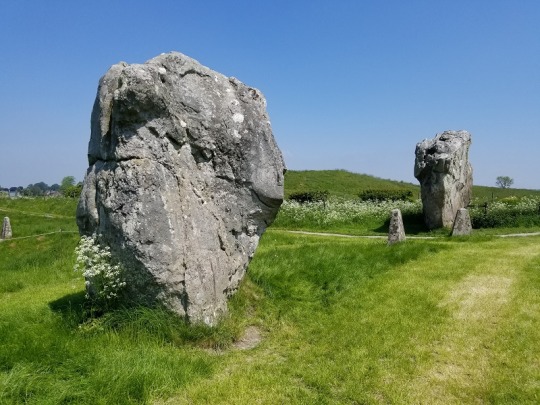
The site isn’t as dramatic as Stonehenge, but it is monumentally bigger--encircling almost an entire village within its outer ring mound. And you can go right up and touch the stones if you like. Just watch out for the sheep.
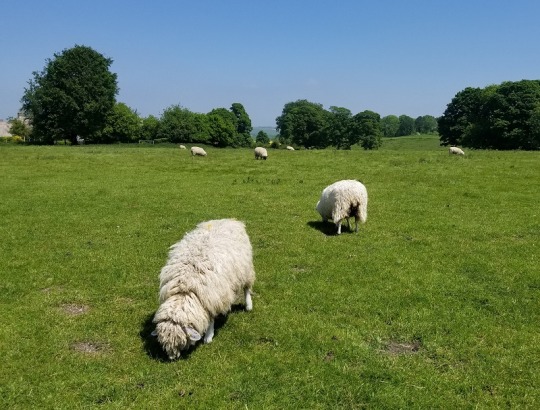
Avebury doesn’t have any stacked stone structures like Stonehenge, but some of the stones at Avebury are bigger than any in Stonehenge.

Some parts of the stone circle are marked with modern placeholders. The circle was largely demolished during the early 1800s. Some stones were taken for use as building material, and others were toppled or buried by superstitious locals who thought they were evil pagan artifacts.
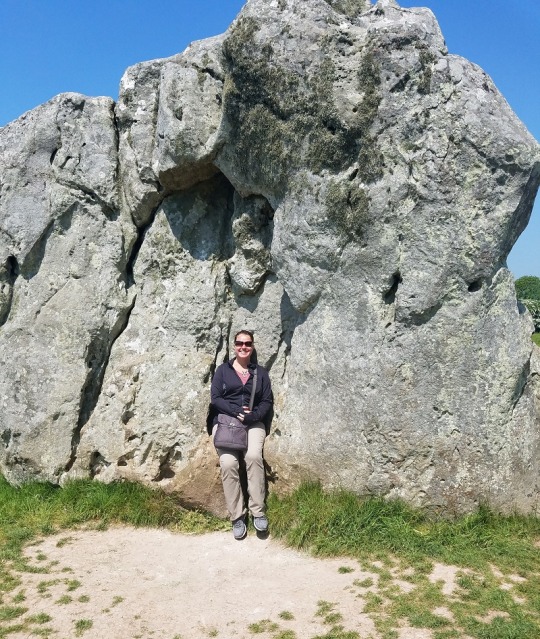
(This one is called the Devil’s Chair.)
Fortunately, an early archaeologist in the late 1600s had made detailed records of the original configuration of the stone circle. With those details, 20th-century archaeologists were able to recover and reinstall most of the stones. The ones that couldn’t be found were replaced with plain markers.
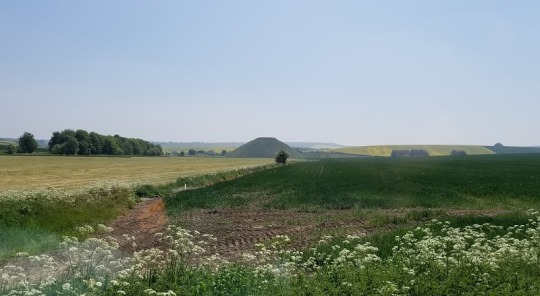
We also saw the nearby Silbury Hill. It is an artificial hill built by prehistoric inhabitants around the same time as Stonehenge. It is over 120 feet high, making it one of the largest prehistoric structures in the world. And like Stonehenge, no one knows for sure what it was used for.
Nowadays, access to the hill is controlled. But our guide remembers being able to sled down it in the winter when he was a kid. But in 2002, the top part of the hill caved into an inner hollow, so it’s probably safer that kids don’t play on it.

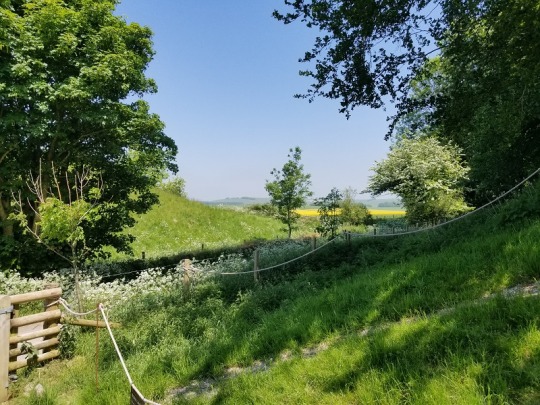
We had more time to wander around Avebury and enjoy the scenery, which made it a very pleasant stop. We were getting pretty hungry, though, so we were relieved when it was time for our lunch stop in Lacock.
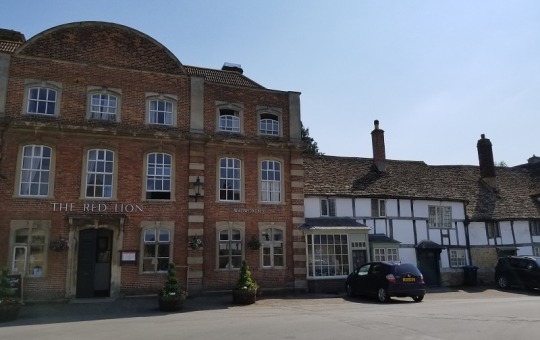
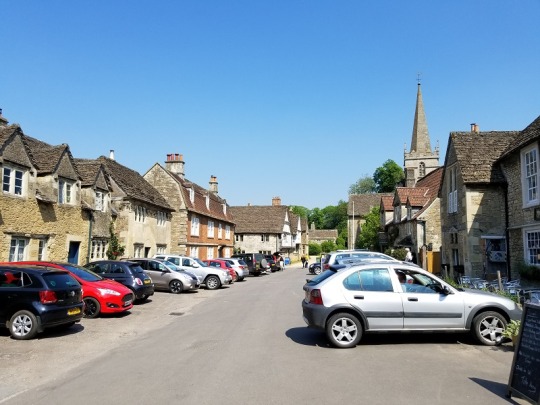
Lacock is a charming historical village where many period movies and TV shows have been filmed, including the Colin Firth version of Pride and Prejudice. We had at the Red Lion pub, which apparently made a cameo in the film.

And tucked away in a far corner of town is the house used as the Potter home in the first Harry Potter film.
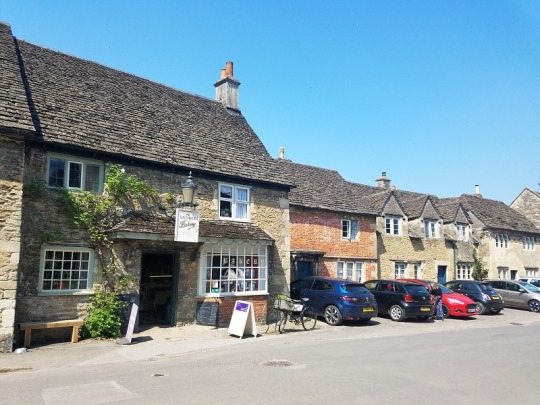
It’s no coincidence that the town has such an authentic historical appearance. Virtually the entire town is owned by the British National Trust, which selectively rents the homes out to established locals. This has kept the village from being filled with satellite dishes and Starbucks. It also keeps it in the hands of the authentic folk of Lacock. Since they don’t actually own their homes, they can’t sell them to jealous millionaires no matter how much they’re offered.
Which is probably a good thing, because there are plenty of other historic villages which have sold out.
Like the one we went to next.
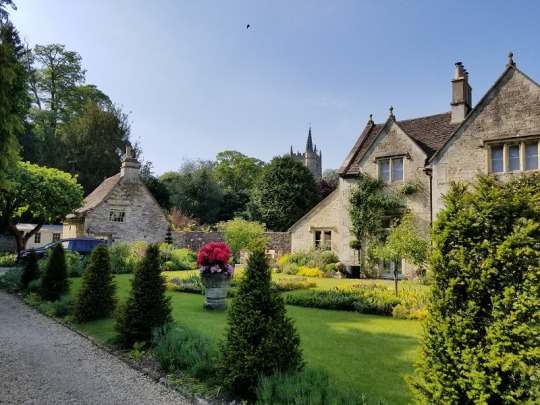
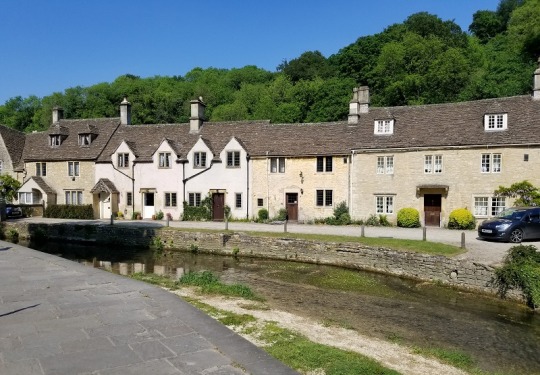
Castle Combe is a cavity-inducingly sweet little town right on the southern edge of the Cotswolds. Its teeny-tiny old-timey charm--actually the result of a centuries-long local economic depression--was thrown into the limelight in the 1960s when the village was declared the prettiest in all of Britain. Since then, Castle Combe (along with the rest of the Cotswolds) has gone through extreme gentrification.
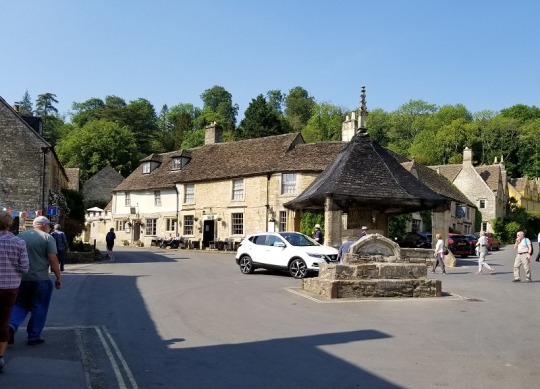
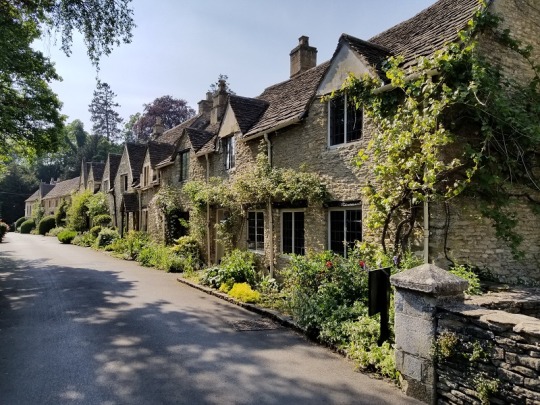
Within a single generation, the Cotswolds has gone from an economic backwater--where the houses were centuries old because no one could afford to replace them in all that time--to a fairyland vacation park for the rich.
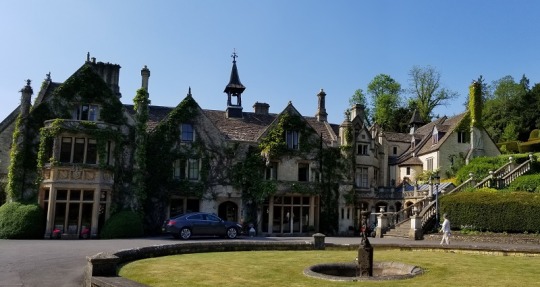

According to our guide, many schools and shops in the area have had to close down because no one actually lives in the villages anymore--the houses are all second homes for millionaires who just drop in now and again for a weekend in the country. Castle Combe is still charming as anything, but I agree with our guide that it doesn’t really seem to have a soul the way Lacock still does.
Back in Bath, we caught the #4 bus, which definitely does at least go out of town, if not back into it. Getting into the English spirit, we’ve been watching British panel shows. I’ve got Jessica hooked on one of my favorites--Mock the Week.
Overall, we were very happy with our day tour. We would have liked some more time at some of the sites, but there’s only so much you can fit into one day. The tour was the first of two that we would be taking with Mad Max tours. The name isn’t a reference to the Mel Gibson movie; it’s from the names Maddie (the tour company’s founder) and Max (her dog, who she would take with her on tours).
Next Post: Glastonbury and Wells (or, the #4 Bus–It does exist!)
Last Post: Bath (or, the #4 Bus–Does it exist?)
#180abroad#bath#england#travel#stonehenge#avebury#stone circles#druids#lacock#cotswolds#mad max tours
1 note
·
View note
Photo
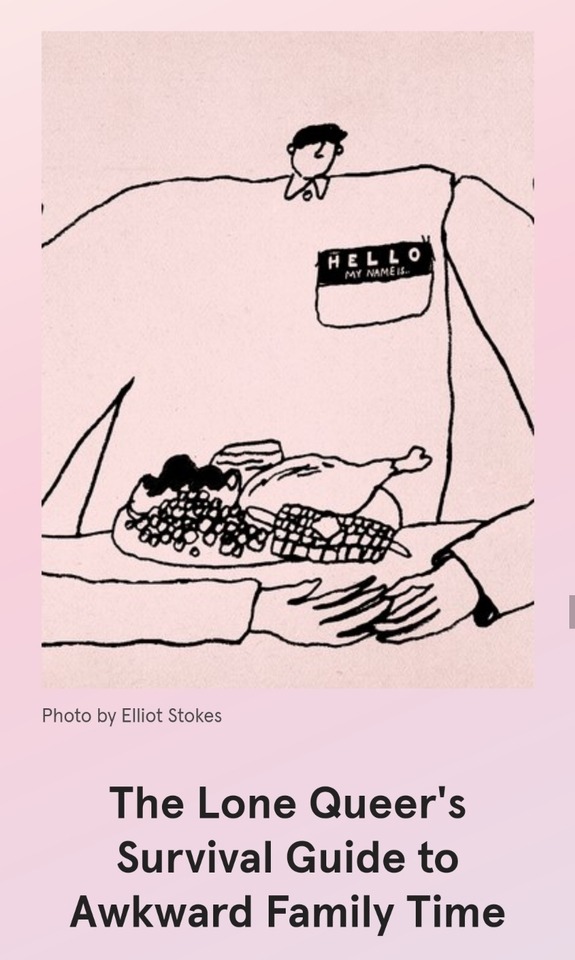
Brace yourself — the holiday season is upon us. Returning home for the holidays can be complicated for us queer folk, as our families are often unprepared to behold the incandescent, gender-transcendent, anti-establishment beings we have become. Take my family for example: We love baseball (not me, I’m too gay for sports) and we LOVE the holidays. Our Thanksgiving menu consists of classic American holiday fare: turkey, cranberry sauce, yams with marshmallows, plus The Outlier: sticky rice with Chinese sausage, to remind us where we came from. We are, dare I say it, very "diverse," so our holiday dinners look like a Norman Rockwell painting, if Norman Rockwell had had a 90’s post-racial utopia phase. I even have some relatives who are queer… though we don’t really talk about that. My fam is stuck in a time machine set to "early 2000s liberalism," so I find coming home queer for the holidays can be difficult. They’re not sure what to make of my constantly shifting gender presentation, much less my conflicting feelings about getting joy from a holiday I objectively know is about genocide. It gets awkward real fast. If you feel similarly, here are some #lifehacks for being queer and home for the holidays! 1. Wear a name tag. Maybe this is your first holiday season going by a new name. Maybe you look really different from last year. Maybe both! In any case, you deserve to be recognized for who you are. The first time I shaved my head, my dad walked me around a dim sum hall "introducing" me to relatives I’ve known my whole life, trying to justify my new look. “This is Jes, you remember, right? The flamboyant artist?” I thought to myself, “I’m not an ‘artist,’ DAD, I’m just queer.” (Since then I’ve realized I can actually be both.) Avoid this awkwardness with a handy dandy name tag! Now everybody knows you’re the baby cousin who took off your diaper and climbed into the cranberry sauce that one year, even though you’re grown up and have a giant septum ring now. Or, you have a new name and a giant septum ring, and nobody knows why you remind them so much of their baby cousin who took off their diaper and climbed into the cranberry sauce that one year. You’ll get to eat your siu mai, or mac 'n' cheese, or whatever, in peace. 2. Bring a decoy. Okay, so maybe the name tag didn’t work, and people are still calling you by the wrong name. Tremendous bummer. Really puts a lump in your mashed potatoes. Divert that negative energy by carrying a decoy that bears your deadname during all your interactions with stubborn relatives. It can be a teddy bear, a Bratz doll, a small porcelain cherub, really anything you like. I prefer a sock puppet. Suddenly, it’s [Deadname] the Sock Puppet who has “grown into such a lovely young woman,” [Deadname] the Sock Puppet who “should really man up for once,” and [Deadname] the Sock Puppet who “used to be so beautiful, before they got all those Friday the 13th flash tattoos.” It’s not about you anymore. It’s about the sock puppet. And your sock puppet will love the compliments. 3. Make friends with animals. Socializing with humans — especially humans you’re related to — can be extremely taxing. Instead, wander away from the party to make some animal friends. Animals don’t speak human languages, so they don’t have trash opinions about our current president (though it is highly speculated that all animals hate Trump), they won’t say your gender-neutral pronouns are “grammatically incorrect,” and they will never refer to your partner as your "roommate." One of my most distinct memories from a childhood Thanksgiving is of the time I met my cousin’s pet hedgehog, Barbie. Barbie didn’t care that she was more of a chubby, spine-covered ball than a leggy blonde — she knew exactly who she was, and she was proud of it. I was so captivated by her that to this day, I can’t remember anything else from that night. Barbie was a true queer icon. You, too, can forge such meaningful bonds with whatever cat, dog, or bearded lizard you can get your hands on. And before you know it, you’ll feel just like a Disney Princex. 4. Use your queer powers for good. There’s no doubt about it: queer people are powerful. Whether our experience with family is positive or negative, we have the power to heal, and the power to destroy. As a wise man in a gender-nonconforming, but culturally appropriative outfit once said, “use the force, Luke.” Unless your name isn’t Luke, in which case refer back to #1. Use your fashion influence — lez be real, you’re probably the most fashionable, or at least most self-actualized member of your family — to show your nieces and nephews that their “pilgrim hats” and “Indian headbands” aren’t a cute look ("so 1600s colonialism!" "so 20th century romanticism of genocide!"). Shadow your uncle in the kitchen so you can make a vegan version of his stuffing for your queer fam. Help Gramma pick out a new holiday sweater. Play video games with your burgeoning gender-nonconforming cousin. Who knows? Maybe you’ll help a family member find their truth, and then you won’t have to be the only Gay Cousin. 5. Eat. If all else fails, eat the food. That turkey (or vegan substitute) is calling your name, and yes, it’s the name you are meant to be called. https://www.them.us/story/survival-guide-to-awkward-family-time
250 notes
·
View notes
Link
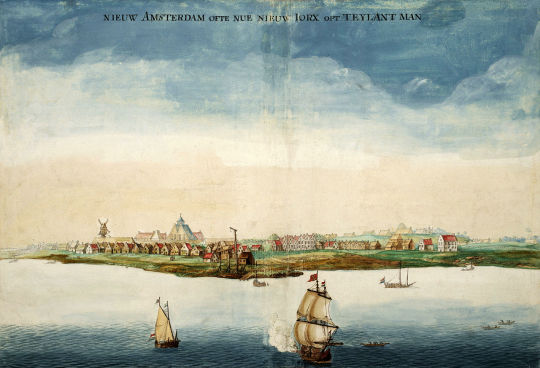
(New Amsterdam in 1664.)
We look at the history and government of New Netherland, the Dutch colony which would become New York after its conquest by England.
>>>Direct audio link<<<
(WordPress) (Twitter) (Libsyn) (Podbean) (YouTube) (iTunes)
Transcript and Sources:
Hello, and welcome to Early and Often: The History of Elections in America. Episode 17: The City on the Edge of Tomorrow.
Last time we sketched out the history of the Iroquois, a confederacy of Indian tribes living in upstate New York. Iroquois culture was changed drastically by contact with Europeans. They launched a massive war of expansion even as their numbers were being reduced tenfold by disease, until finally they fell under Western domination.
Today, we’re going to talk about the Europeans who were closest to the Iroquois in the 1600s, the Dutch in their colony of New Netherland, which stretched in between the Chesapeake and New England. This episode will draw especially from the book New Netherland: A Dutch Colony in Seventeenth-Century America by Jaap Jacobs [Yaap Yacobs], as well as The Island At The Center of the World by Russell Shorto, which is the more accessible of the two.
Our story begins in the Dutch Republic, or what is now the Netherlands. If you don’t know, the Netherlands are a low-lying country in Northern Europe, sandwiched today between Germany and Belgium. Throughout the 1500s the Netherlands were under control of the Habsburg dynasty in Spain, and so they were known as the Habsburg Netherlands. But in 1568 the Dutch revolted against their overlords, and over the course of a decades-long war, won their de facto independence.
After the Dutch broke away from Spanish rule, their society progressed rapidly. They were pioneers in banking, finance, and law. Much more so than any other nation in Europe they became a commercial people, filling the role that Venice and the Italian city-states had in the late Middle Ages. They were middle class and mercantile.
The Dutch were also pioneers in government. Upon independence they became a republic, which was highly unusual amid all the European monarchies of the day. They had at first tried inviting aristocrats to rule them, but everyone refused out of fear of offending the Spanish. So a republic it was.
The Dutch Republic was also known as the United Provinces, and as that name would suggest, it was a confederation of seven quite independent provinces. These provinces each had their own currency, their own laws, their own courts, and their own assemblies, with varying levels of representation and suffrage. Of these provinces, Holland, which was as home to the capital, Amsterdam, was by far the largest, the richest, and the most powerful. Holland paid for over half of the budget of the Dutch Republic. Which is why, even today, “Holland” is often used to refer to the Netherlands as a whole, even though that’s not actually correct.
The government of the Netherlands as a whole was in the hands of an assembly known as the States-General, which mostly just had control over foreign policy, since each of the provinces were in charge of their own internal affairs. Each province had one vote at the States-General, though they could send as many representatives as they wished. Under the control of the States-General there was an executive council, as well as various other officials and administrative bodies, as one might expect.
Although it was a republic, the government tended to be dominated by the elite merchant families as a de facto oligarchy, especially as time went on. And there were some offices, such as stadtholder, a very important position, which became openly hereditary over time.
That’s how the republic operated in a nutshell. It was complicated, decentralized, semi-representative, and relatively open by the standards of the day. Things were much more complicated than what I could describe in this extremely brief sketch, but there’s no need to get into more detail, since the government of New Netherland was actually nothing like this. It was much simpler and much less representative, as we’ll see. But I still want to give you an idea of where the colony of New Netherland sprang from.
The Dutch Republic was a strongly Protestant nation, but it was also known for its tolerance. The law stated that “each person shall remain free, especially in his religion, and that no one shall be persecuted or investigated because of their religion.” There was a national church, but membership wasn’t obligatory.
As a result, the Netherlands became a haven for dissidents. Jews from across Europe flocked there. And when the Pilgrims fled England, it was to the Netherlands that they went first, before they decided to press on to America. So too did John Locke spend five years there. Many controversial books were first published in the Netherlands, even if the authors came from elsewhere, like Galileo. According to Colin Woodard, “Modern scholars have estimated that Dutch printers were responsible for half of all the books published in the seventeenth century.” This tolerance wasn’t absolute, but it was certainly freer than the rest of Europe.
This openness helped make the Dutch Republic into one of the cultural centers of Europe. The philosopher René Descartes lived there for 20 years, and the philosopher Baruch Spinoza came from a Jewish family that had fled Portugal during the Inquisition. Painters such as Rembrandt and Vermeer were Dutch. You can see why they called the 1600s the Dutch Golden Age.
And the Dutch weren’t just developing domestically during this period, they were also expanding their presence overseas, through both trade and warfare. Their primary interest was in Asia. They had begun conquering parts of Indonesia in 1605 and they’d gone as far as Japan by 1609. This was at a time when English efforts at expansion and trade were really only just beginning. Although the Dutch Republic was young, it soon became a trading powerhouse, the envy of Europe.
The Americas, however, were a secondary priority in all this. And to the Dutch, North America was even less of a priority than their possessions in Brazil. So the colony of New Netherland was at the time a sideshow to a sideshow. Nevertheless, it is to that colony that we now must turn.
The story of New Netherland itself begins with Henry Hudson, an English explorer. Hudson had led several expeditions for the Muscovy Company, one of those trading monopolies created by Queen Elizabeth. He had been looking for a northerly route to Asia, with no luck. Thanks to information sent to him by his friend John Smith of Jamestown, he now believed that he could find a route through North America to the Pacific. (Remember, no one knew just how wide the continent was back then.) The Muscovy Company declined to fund his next expedition, so he got support from the Dutch instead.
In 1608 the Dutch East India Company hired him to find a northeast passage, above Russia, but he disobeyed his orders and went to America instead. He reached the mouth of the Chesapeake but didn’t go in, instead sailing north, to a land which had still hardly been charted.
Now, I should probably explain the geography here. If you sail up the coast from the Chesapeake, after about a hundred miles you’ll reach the next big body of water, Delaware Bay, which today divides the state of Delaware from New Jersey. Hudson and his men entered the Bay, but they found it to be treacherous and so they turned back around and continued north. After another hundred something miles they reached what is now known as New York Harbor. This was a much more promising location. If you aren’t familiar with the layout of New York, it’s basically a tightly packed cluster of islands right near the shore, from the western tip of Long Island to Manhattan to Staten Island. It was a great spot for a port. And it was where the Pilgrims originally intended to settle.
But Hudson wasn’t interested in that. He wanted the Northwest Passage. So after some encounters with the local Indians he sailed up the main river which flows into the harbor, now known as the Hudson. But the river was just a river. It certainly didn’t lead to the Pacific. His mission was a failure, so he sailed back to Europe. He hadn’t found a route to Asia, but his report of New York Harbor piqued investors’ interest. It seemed like an excellent location for the Dutch to get in on the profitable fur trade which was at the time controlled by the French.
Hudson, by the way, would make only one more voyage, this time exploring Hudson Bay in Canada. His ship got stuck in the ice and they were forced to spend the winter there. In the spring, when the waters cleared, he wished to continue exploring further, but the crew mutinied and abandoned him, along with his son and some other loyal crewmen, leaving them to their fate in a small boat. They were never heard from again.
But that was of no matter to the future of New Netherland, as the region was named.
Within a few years Dutch traders sent several more expeditions to the area. They established an outpost up the Hudson river at what is now Albany, but for a while the Dutch presence was rather minimal. That began to change in 1621. That year, the Dutch government created the West India Company, which was to be the American counterpart to the Dutch East India Company, which had proved so successful in Asia. The West India Company was given a monopoly on trade with the Americas, and it was hoped by the government that the company would be an effective way to attack Spanish and Portuguese interests in the New World. The main focus of the West India Company was therefore in South America and the Caribbean, but New Netherland fell within their sphere as well.
One of the early goals of the Company was to send colonists to New Netherland, in order to more firmly support the Dutch claim on the lands. The exact borders of their new colony were ambiguous, but it began just above the Chesapeake and stretched into Connecticut, which was also claimed by the English. So basically the modern states of Delaware, Pennsylvania, New Jersey, New York, and Connecticut.
It was hard to get people to go to the New World. Times were good in the Netherlands and there were no persecuted religious minorities like in England, so the pool of recruits was quite small. But the West India Company managed to scrape together a few dozen people, mostly foreigners, and convince them to sail away to America. One of the ships they sent was filled with 30 families. Four couples in the group were even married at sea.
The newlyweds and everyone else began arriving in New York Harbor in early 1624, so in between the arrivals of the Pilgrims and the Puritans. They set themselves up on an island just south of Manhattan. Their first homes were simple pits dug into the ground and covered with bark. It was the beginning of what would become New York City, although under the Dutch it was known as New Amsterdam. A few of the settlers were also sent south to the Delaware Bay and north to Connecticut, to ensure the Dutch claims on the land.
The year after that, settlement began on Manhattan itself. The common story is that the island was purchased from the local Indians for some beads worth $24, but that’s apocryphal. In truth the island was bought for goods worth perhaps a few thousand dollars in today’s money. Still a very good deal, all things considered. New Amsterdam, situated at the southern tip of Manhattan, soon became the capital and the center of economic activity in the colony. It was about 300 miles from Jamestown and 200 miles from Boston. It was also 100-something miles south of Iroquois territory.
This wasn’t a full-scale colonization effort like what the English were pursuing, however. There were some people who supported that approach, but it was deemed too ambitious. Instead, this was more an effort to secure trading outposts. The Dutch wanted a permanent presence, but it didn’t have to be too large. The economy was thus based on trade rather than on farming like in New England or the Chesapeake. There were still plenty of farmers, of course. But that wasn’t what New Amsterdam was about.
People continued to arrive in the colony, in dribs and drabs. (By the way, the mortality rate on a voyage like that was about 4 percent, according to Jacobs. Imagine if every time you flew across the country you had a 4 percent chance of dying. Not great.)
Many who came to New Netherland were merchants or craftsmen. Others were soldiers in the service of the Company. Most of these men left America after a time, but some remained, forming the nucleus of a new community. There were servants too, who were generally better treated than their counterparts in Virginia. Their terms of service were briefer, their contracts couldn’t be bought and sold and it was easier for them to escape from abusive masters.
In addition to New Amsterdam, the Dutch also continued their presence up the Hudson River, at Albany. This brought them to the southern edges of Iroquois land. Specifically, land controlled by the Mohawk. The land to the south was controlled by various Algonquian tribes, as I discussed last episode.
The Dutch had at first befriended the Mahican tribe, an Algonquian-speaking group that lived closer to the coast. The Mahicans had welcomed the Dutch as potential allies against the Mohawk, who were aggressively expanding their territory. But when the Dutch tried to support their new friends against the Mohawks, they were swiftly defeated. One Dutchman was even cannibalized. The Dutch soon decided that it was better to befriend powerful tribes rather than weaker ones, and so they became major trading partners and sometime allies of the Iroquois instead.
Like the Puritans, the Dutch also adopted the use of wampum as money, along with beaver pelts, although fur was a less than ideal currency, since the quality of the pelts was quite variable.
Trade with the Native Americans was always a fraught issue. In order to keep the Indians weaker, selling them weapons was prohibited, and could result in the death penalty, at least in theory. But that wasn’t enough to stop the trade. Certainly the Iroquois got their hands on enough guns to rapidly expand their territory, as we heard last time. Later on those restrictions on selling guns would be loosened, in acknowledgement of their ineffectiveness.
Alcohol too caused problems. Alcohol and the social ills associated with it were European exports just as much as guns and diseases were. Drunkenness and alcoholism soon became chronic problems among the Indians. Because of the disruption it caused, not just to the Indians themselves, but to relations between the Indians and the Dutch, selling alcohol to Indians could result in “a fine of five hundred guilders, flogging and banishment. In practice, however, punishments were much lighter,” according to Jacobs.
Dutch efforts to convert the Indians to Christianity were less successful than those of the Jesuits in French territory. The Dutch were less willing to meet the Indians halfway, as it were, to learn their languages, that sort of thing. There were some wars between the two groups, but they weren’t as bad as what happened in the English colonies. Overall, the Dutch presence was just too small and too focused purely on trade to cause the same sort of problems.
The government of the colony was in the hands of the West India Company. The Company was not totally independent from the Dutch government — the state had a representative on the board of directors and it was also partly subsidising the Company — but it was a private, for profit enterprise. So the ultimate loyalty of New Netherland was to the Dutch Republic, but in practice administration was in the hands of the Company. Well, in actuality, a small committee within the Company made most of the decisions.
Within the colony itself, administration and justice were in the hands of the Director-General and an executive council, all of whom were appointed back in Europe. The Director-General was the equivalent of a governor, although of a slightly lower rank, since New Netherland wasn’t deemed important enough to have a full governor. The Director was the chief executive, but he was obligated to seek the approval of the council. He wasn’t free to act on his own. And all of their decisions and laws were ultimately subject to approval from the Company.
There were no elected positions within the colony at all. The West India Company was directly in charge. They appointed the Director-General and his advisors, with no equivalent to an elected lower house.
In its early years the colony was beset by bureaucratic infighting and weak yet authoritarian leadership. The officials who were willing to go to America were generally second rate, and in 1632 the Company, according to Jacobs, had to “replace the entire administration”. According to Charles M. Andrews, one director alone was “charged with pride and vainglory, with indolence and carelessness, with drunkenness ‘as long as there is any wine’ and with hostility towards religion.” The next director started a fruitless years-long war against local Indian tribes, only to be recalled in disgrace and then die in a shipwreck on the way back to Europe. Needless to say, this sort of general mismanagement didn’t help in attracting more settlers.
In the beginning, New Amsterdam was a rough town, violent and boisterous. Bars, prostitution, pirates, etc. Like Jamestown had been, the colony wasn’t yet a fully realized society, it was just an outpost.
In these first few years New Netherland didn’t prove very profitable. This led to a split in the company. Some wanted to minimize further investment. That way, the Company could still reap the profits of the fur trade without much further cost. Others wanted to expand the colony into profitability by attracting enough farmers to make the colony self-sustaining. Then, perhaps, even bigger profits could be made thanks to their monopoly on trade.
The two sides compromised by coming up with the patroonship system. The patroonship system was an attempt to attract wealthy settlers by offering them large estates. In exchange for bringing 50 or more colonists to New Netherland, these wealthy settlers, or “patroons” as they were known, would each be given a great deal of power on their lands, similar to what the Lords Baltimore enjoyed in Maryland. They would have near-absolute authority, with all powers of government, even the right to execute subjects. The goal here was to make others bear the costs of colonization, since the Company was unwilling to pay for it itself.
A number of members of the West India Company set up patroonships of their own, but unfortunately for them, few people wanted to live under such conditions. Some patroonships never got off the ground. Another was entirely wiped out by Indians. Only one lasted longer than a few years.
Just as in the English colonies, any attempts to establish feudalism in the New World were pretty much dead on arrival. Overlords like the Baltimores could keep things going for a while, but only in the face of ongoing resistance from the colonists.
You might think that it would make sense to go in the opposite direction and make the colony more politically open. That worked well enough in Jamestown, after all. Well, perhaps they could’ve, but the situation in New Netherland was different. The Virginia Company had had constant money problems, and Jamestown was the only settlement they controlled. The West India Company, on the other hand, had other, more important possessions in the Caribbean and Brazil. New Netherland was a secondary concern and they didn’t feel the need to attract a lot of migrants, as the Virginia Company had. And they weren’t sure about the financial wisdom of expansion anyway. Perhaps partly as a result, there wasn’t the same pressure to add some sort of representative element to their rule.
Nevertheless, over time towns popped up across New Netherland, but all of them remained small. A number of these towns, particularly on Long Island, were settled by the English rather than by the Dutch. As I mentioned, the border between New Netherland and Connecticut was unsettled. As a result, a number of English towns were founded in territory that was thought to be English but wound up being controlled by the Dutch instead. Other times, it was because settlers were fleeing the persecution of New England. You’ll recall that Anne Hutchinson left Massachusetts for Rhode Island and then went to New Netherland, only to be killed by Indians along with much of her family.
These English towns were given a good deal of independence, and to some extent they just replicated the New England way of doing things, although there was nothing like the full-on town meetings in New England proper that we’ve heard about.
Local towns often had at least some say in the officials who were put in charge of them, but their choices were still subject to Company approval. These local officials were tasked with routine administration and the hearing of minor court cases. But overall, as you can see, there was very little popular participation in government. Things were done in a top down way, even if the colonists were given at least some input from time to time.
Residents of the colony were also sometimes called on to give advice to the Directors, through the creation of informal groups of counselors. But in practice things often got more complicated than you might expect.
For example, in 1641 a farmer in New Amsterdam was killed by an Indian. In response to this attack the Director-General, Willem Kieft, the guy who would drown in a shipwreck, called together the heads of local households to give him advice. Those men then chose from among themselves twelve men to counsel the Director. That was at least kind of an election I guess.
This body, known conveniently as the Twelve Men, went well beyond its instructions, offering the director more than just recommendations on policy towards the Indians. They also requested changes to the colony’s administration and courts. The director was reasonably receptive to some of their proposals, but he nevertheless soon dismissed them and forbade them from meeting again, lest they start to get ideas.
However, relations with the local Indians broke down further, with a massacre of some 80 natives followed by further reprisals against the settlers. Kieft felt it wise to summon the burghers, who were sort of the equivalent of freemen, for further consultation. From those 46 burghers, eight were elected to serve on a new body, known conveniently as the Eight Men.
The Eight Men had a bit more power than the Twelve Men had had. They weren’t just there to provide advice on a specific issue, they also had the right to recruit soldiers as needed. But they weren’t supposed to have any real authority. Nevertheless, just like the Twelve Men, they also went beyond their instructions, going over the director’s head by sending requests for assistance back to the Netherlands. In the next year, 1644, they even tried to get the director removed, and convince the West India Company to grant them a representative government. They asked for the right to “elect from among themselves a Bailiff or Schout and Schepens,” (those are just the names for government positions), “who will be empowered to send their deputies and give their votes on public affairs with the Director and Council; so that the entire country may not be hereafter, at the whim of one man, again reduced to similar danger.”
This was quite a big request, to completely change how the colony was run. For the most part, the Company ignored it. They did decide to recall Kieft for incompetence, but that was about it.
Kieft’s replacement, Peter Stuyvesant [STY-vuh-sunt], would serve as Director-General for the next seventeen years. Stuyvesant, the son of a minister, was only 35 when he arrived in the colony. A college dropout, Stuyvesant joined the West India Company as a young man and quickly rose through the ranks. He was named governor of the island of Curaçao in the Caribbean. While serving there he led an attack on another island, only to get hit by a cannonball and lose his leg in the fighting.
He returned to the Netherlands to recuperate, and while there the West India Company named him the director of New Netherland. Beyond his bravery, he also had a reputation as a strong leader and a solid administrator, so he was a natural choice for the position, despite his new peg leg.
When he arrived in New Amsterdam Stuyvesant faced the problem of what to do with the Eight Men. After all, in their appeal to Amsterdam they had been quite disobedient to the previous director, even treasonous. And the new director was certainly no fan of representative government. After a trial in which the colonists refused to back down, Stuyvesant sentenced a few of the ringleaders to banishment.
The Eight Men were thus disbanded, but in their place Stuyvesant created a new grouping of nine men, conveniently known as the Nine Men. Realistically, he had to give the colonists at least some input if he wanted to raise funds and keep things running smoothly. The way this worked was that the local burghers named eighteen men, and Stuyvesant and the council picked nine of those men to actually serve. This practice is sometimes known as “double nomination”. It was a way to balance popular control with central control. Both the people and the government had veto power over nominees.
Anyway, three of the nine men were to be merchants, three were burghers, and three were farmers. Six of the nine men would be replaced each year.
Like the Twelve Men and the Eight Men, the Nine Men had limited authority which they nevertheless exceeded. When Stuyvesant got word that the Nine Men were sending a new petition back to Amsterdam behind his back to undermine him, he had their leader Adriaen van der Donck, imprisoned for libel, though he was later freed. Afterwards, van der Donck returned to the Netherlands to argue his position, on behalf of the colonists. They had several demands, including the creation of a city government for New Amsterdam, which actually had less independence than the outlying towns did. Most importantly, they wished to be freed not just from Stuyvesant, but from the West India Company altogether. They wanted to be ruled directly by the Dutch government.
He arrived in the Netherlands in 1649, soon after the beheading of Charles I, as well as after the signing of the Peace of Westphalia, which ended both the 30 Years’ War in Germany and the 80 Years’ War between Spain and the Dutch Republic. Finally, Dutch independence was fully recognized. The treaties of Westphalia were also an important precedent in the idea of states as sovereign entities on an equal diplomatic footing, as opposed to the earlier system based around webs of feudal loyalties. Big changes were happening in Europe.
Anyway, the colonists presented their lengthy petition to the States-General, arguing that the Republic would be strengthened by the full annexation of New Netherland, which could in time hugely boost the income of the small Republic.
The ideas were actually favorably received, although the government didn’t go so far as to agree to annexation. They did, however, agree to some substantial changes, such as adding a number of elected men to the council. But thanks to delays within the Netherlands and the start of the First Anglo-Dutch War, which I’ll get to next episode, those proposals never went anywhere. The only real change was the creation of a city government for New Amsterdam, but there weren’t any elections even for that. Instead, officials choose their successors through a process of double nomination, much like with the Nine Men.
Overall, the Company was still in charge.
So that’s a brief summary of what the government of New Netherland was like. It may have been a bit confusing, since there were a lot of half-implemented ideas and whatnot, but let me give a brief summary to make sure everything’s clear.
New Netherland was ultimately in the hands of the West India Company, and it was the company which appointed the top officials in the colony, the director and the councilors, who had final authority within the colony itself. There were no elected assemblies, but there were occasional advisory bodies chosen from among the colonists, with few official powers. Towns weren’t self-governing, but they did have some say over the officials who were placed in charge of them. And throughout the second half of the colony’s existence, there was constant pressure for greater self-government.
The rule of the West India Company was always going to be an awkward fit once colonization took off. The Company was focused on profit, but the colonists themselves wanted good government, and those two interests didn’t necessarily go hand in hand. Things were rarely terrible, but the Company was seen as an impediment rather than an ally. The Company perennially underinvested in the colony. Teachers were scarce, and public buildings were shoddy. Even the fort was in a state of disrepair. Quite a contrast to New England, where the citizens were in direct control of public spending.
Just like how in the English colonies many would have preferred direct rule to the control of some proprietor, many in New Netherland would rather have been ruled by the Dutch government itself, or maybe even by themselves. We can see in New Netherland the same sort of mildly rebellious attitude that existed in the English colonies. Nobody was thinking about full independence, but the citizens did want to have a major say in how things were run, and the ability to veto policies they didn’t like.
It seems clear to me that sooner or later, changes would have been made as the colony grew and as demands for reforms increased. But because of the English takeover, all of that came to a premature end. Well, the pressure for self-rule would continue, but it was under an English flag, and not a Dutch one.
Next episode, we’ll both continue and end the story of New Netherland, by diving into its conquest by the English. So join me next time on Early and Often: The History of Elections in America.
If you like the podcast, please rate it on iTunes. You can also keep track of Early and Often on Twitter, at earlyoftenpod, or read transcripts of every episode at the blog, at earlyandoftenpodcast.wordpress.com. Thanks for listening.
Sources:
The Colonial Period of American History Volume III by Charles M. Andrews
History of Elections in the American Colonies by Cortlandt F. Bishop
New Netherland: A Dutch Colony in Seventeenth-Century America by Jaap Jacobs
The Island at the Center of the World: The Epic Story of Dutch Manhattan and the Forgotten Colony that Shaped America by Russell Shorto
The Dutch Republic in the early seventeenth century by J.P. Sommerville
American Nations by Colin Woodard
20 notes
·
View notes
Text
10 - 8 notes
vice presidential debate 4th debate . next week is first map test .
Roughly 20 people killed in Salem hanging
possible causes of Salem witch trials. why did these horrible things happen?
A pre scientific world view , belief in magic.
critical thinking skills develop as we grow
teenage girls being evil/spiteful towards their elders. the first several people accused were older women with no male relative to defend them. no brother or husband or grown son to defend them. vulnerable older women. possibly they had dementia, or hallucinations, facts mixed up
a theory that perhaps unconsciously the people of Salem village, is just down the road from Salem town. -right on the fork by the ocean 2 miles down the road. Salem village were still poor, Salem town was rich people. some historians realized some of the first 3-4 people accused were shirttail relative of the 3-4 wealthier families. so this is how they directly strike out against rich families.
during this time they did not have lengthy prison sentences. no prohibition against cruel and unusual punishment. you could be hung for shoplifting. hundreds of civilians would watch the hangings.
they believe massachusettes is a commonwealth. the wealth is held in common for the good of everybody.
the whole church community congregation bring food to a 30 year old widow , supply her children with shoes,
if you are needy the people of church will help you. they are going to be firm with you not just let you laze around, but they will help you too. lovingly supportive but firm. no homeless people.
the puritans were not squeamish about sexual relations. 1 of the good things we can get from the puritans is a good work ethic, universal public education laws.
the south did not have education until after the civil war.
max Weber (vaber) the vaber thesis Late 1800′s - 1930s. 1 of the founders of sociology. psychology comes from the Greek word for mind. social science is called the soft science. economics, etc
hard science--physics etc
max vabers thesis, says Calvinism and protestestinsm in general is the cause of capitalism.
capitalism - individual businessmen building up wealth.
max vaber publishes article on capitalism and Calvinist Protestantism, where the government was mostly protestant on how capitalism got started.
this was a dominant idea for 40-50years.
Calvinism helped cause capitalism.
that protestant work ethic busting our rear ends. if we prosper god smiling on us , we are saved. the south is wealthy tight-water families.
England the industrial revolution , its illegal to take factory parts out of England. an Englishman got upset, memorized it all and came to America and did it here.
the vaper thesis was largely discredited.
a big grain of truth to the vaber thesis. even now Germany is the wealthiest country.
new England is shaped by Protestantism.
new England is massachusettes and Rhode island and Connecticut, new Hampshire, then Vermont after the revolution becomes a state. then Maine.
#$%^&*()_$%^&*()_#$%^&*()
THE MIDDLE COLONIES.
new York - founded by the dutch - was originally called new Amsterdam.
2 Pennsylvania
both of these are good sized big colonies
the dutch were very cosmopolitan. cosmopolitan used to be a serious magazine exposing corruption. the dutch founded new york. cosmopolitan means worldly. the dutch took everybody in like a big kindhearted grandma. even muslims.
some of jews and muslims went to netherlands???
christians could not be money lenders. you cannot be a catholic banker.
jews can though.
muslims can too.
they take their skills to netherlands and help the dutch get rich. then they come to new york.
muslims come to new york. “their were muslims here before your ancestors, just right after the pilgrims 10-15 years later”
william penn. his dad loaned a bunch of money to the english king.
pennsylvania was run by a family.
pennsylvania was a proprietory colony.
farming is very big here.
teddy and franklin roosevelt from them.
THE TWO SMALLER MIDDLE COLONIES
new jersey the garden state.
delaware. the first state.
philadelphia biggest city by mid 1700′s city of brotherly love
334%674567834567834567345673456745678
Scots Irish.
started out in Scotland which is directly north of England. Scotsman don't like to be associated with Englishman. Scotland is the poorest part of the British isles.
Scotland has always been poor.
the Scots were always very poor and very violent in ancient times.
England has some good soil, Ireland has very good soil. Scotland has bad soil. Scotland has always been poor.
the English looked down on the Irish and treated them like 2nd 3rd class citizens.
1500 all the Scottish became Presbyterian Calvinist. lowland Scots. “good Calvinists struggling to get by”
late 1500s through 1600s the English government make
the Scotsman move to Ireland and very cranky about it.
assimilate. mostly the Scots don't fit in with the Irish and they resent the English government.
the Scot Irish stay in Ireland 1 or two generations but become listless.
in 1700s they decide lets get out of Ireland. where can we go without getting hassled? lets go to America.
the Scots Irish come over here in large numbers.
by the time they get here all the good land in the coastal areas is taken. the English settlers took it. so they make a direct line to the frontier. they pour into two colonies, Virginia and Pennsylvania.
as a family the Scots Irish they head west. they are feisty and cranky. they become Americas premier frontiersman. they don't like the English government. feel like the English government is always in their face always harassing them.
develops some inventions. Pennsylvania rifle. THEY ALTER THE RECIPE.
you always see the scots irish wearing the BUCK SKIN OUTFIT.
musket. WATCH MOVIE AMERICAN CLASSIC GONE WITH THE WIND -- MASTER AND COMMANDER RUSSEL CROWE
the swedes come to america bringing the log cabin to america.
the north is growing corn and beans. the scots irish are generally content to plow around the stumps. jefferson wants them to fill up a whole county.
0 notes
Text
A Hunter’s Thanksgiving
Summary: The reader tries to make it a memorable Thanksgiving but things don’t go as planned.
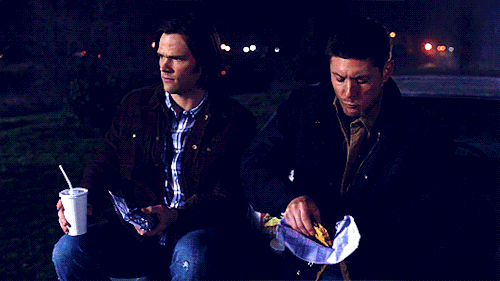
Word Count: 1082
A/N: Hey, so it’s Thanksgiving weekend here in Canada! I thought I’d write a short little thing to celebrate
Smoke plumed out of the oven and you tried to swat it away as you pulled out the very burnt pie; the kitchen in the bunker quickly took on the sour smell of your failure.
You set it on the counter in the middle of the room and flung your oven mitts across the room in frustration.
“Can’t even bake a goddamned pie.” You grumbled softly to yourself as you swatted away the fumes. On the plus side, the smoke detector on the ceiling hadn’t worked in years according to Dean. At least the boys were too preoccupied with their own problems, and hunting, to pay attention to whatever you were doing in the kitchen.
The bunker had started to get warm and cozy back in September when the temperature began to drop; it was a comforting atmosphere that you and the boys all appreciated when you came home from hunting - especially when it started snowing.
It had been a long time since your last real Thanksgiving.
It wasn’t like you didn’t have a family to spend holidays with. Most hunters had these tragic backstories that somehow pushed them into hunting; but not you. Your parents lived in Saratoga Springs, happy and retired and perfectly content knowing that you spent your life traveling the country doing “odd jobs”.
The last thing you wanted was to interrupt their quiet lives. And besides, you had the Winchesters to keep you company.
“Alright, Y/N. Take two..” You breathed out softly and tied up your hair.
Two hours. It took you two hours before you finally gave up and lay down, face first on the floor. You’d failed.
All you wanted to do was have a nice dinner ready for the boys when they got back, which was supposed to be soon; and you ended up with a burnt pie, mushy string beans, and a few severely overcooked chicken breasts.
If you weren’t such a great hunter, you were sure you’d go to culinary school. If you tried really hard, you could probably screw up scrambled eggs.
“Y/N, you seem distressed.” Castiel’s voice came from somewhere above you and you could tell he was looking at the mess you’d left around the kitchen.
“Yeah well,” You pushed yourself up off the floor, as to not embarrass yourself further.
“Guess that’s what happens when I try to do something nice.” You chuckled softly and sighed.
“What were you trying to do?” The angel asked, his head tilted to the side a little.
“It’s Thanksgiving. I thought maybe I’d make Sam and Dean dinner for when they come back. But my cooking skills aren’t exactly up to requirements.” You put your hands on your hips and took another breath in. Cass’ eyes squinted in that way they did when he was trying to understand something.
“What is Thanksgiving exactly?” He asked you, poking at the burnt pie crust still in the tin you’d used. Black residue covered his fingertips.
“Well, it’s when you get together with your family, and you eat a bunch of food and you appreciate what you have.” You started to clean up your mess since your meltdown distracted you from that.
“Is it a common custom?” He looked at you and carried a few dirty dishes to the sink. You filled the basin with hot water and dish soap and you watched the bubbles increase their volume. You nodded and started scrubbing.
“Guess so, happens every year. November for the States, but it happens sometime in October in Canada, I have no idea why.”
“How did the tradition start?” He asked you, he was playing with a handful of bubbles and you smiled.
“Um,” You tried to recall anything that you remembered from textbooks.
“The first one was after the first harvest of the pilgrims sometime in the early 1600′s. According to someone who was actually there, about 90 Native Americans attended.” You glanced over at Cass who was very interested in getting a plate perfectly clean.
“The feast lasted three days.” You giggled softly and he looked at you.
“That is a lot of food.” He muttered, a little dumbfounded, his blue eyes were bright with curiosity. You nodded and grinned. Castiel was sweet and interesting to talk to since he hadn’t spent a lot of time studying human customs and cultures.
“Sounds like a party to me.” Dean’s voice boomed from the back of the kitchen, he chuckled softly. You looked over your shoulder and scoffed.
Both Sam and Dean were covered in mud, blood, and probably some sort of monster goo.
“Wow, you two really dress to impress.” You chuckled and continued to wash the plates and pans.
“What happened in here?” Sam smirked a little, his eyebrows raised as he looked around the room. His hair was matted in some places from the hunt, and it fell in front of his eyes.
“Well, I was trying to make a nice Thanksgiving dinner, but that all went to shit so now I’m drinking away my sorrows.” You held up a bottle of whiskey that happened to be sitting in the cabinet above your head, and you took a drink.
Dean laughed and his eyes found the blackened pie on the counter.
“You monster!”
Your new plan fell into motion as the boys went to go shower. Cass was able to get you to the nearest chicken place in a few seconds, so having him around had proved handy.
You returned with a bucket of extra crispy fried chicken, the closest thing you had to turkey, and a big smile on your face. Cass set the six-pack of beer on the library table and he nodded. You were going to go with tacos, but that was about as far as you could get from Thanksgiving food.
“This is a very nice gesture, Y/N.” He smiled at you and the boys both emerged from the kitchen, clearly looking for you. They smiled.
“What’s this?” Dean got closer, eyeing the bucket of fresh chicken.
“My Thanksgiving didn’t work out but that’s not really what matters. What matters is that we’re together. And you took a shower.” You giggled and Dean shoved you playfully.
God, that sounded so cliche, but it was true. Dean wrapped an arm around your shoulders. They were just like older brothers, and you loved them.
“This is awesome, kiddo.” He sat down eagerly with his brother and they began picking away at the drumsticks and drinking the beer.
Always Tags: @knightofmischief @potato8queen @sherlock44 @too-much-winchester @krista200022 @mcdoyle22 @thegameisafootwatson @leiassorganaa @arixky@katestiel @kylorentrsh @trashbutnotforyou @angel-allie-exol-army@thedamnchesters @kickasscas67 @hoe-zier @kyara2015@trustnobodyshootfirst @all-ur-friends-r-dead @rhae-winchester @one-shots-supernatural @spn-imagineers @abigrumple @livelovelike555 @missdestiel67@lemonadegazeelle @elsatxx @superhero-lover101
Dean tags: @jesuisdabbo @akshi8278
Sam Tags: @chipmunkrightsactivist @carbonated-beverage @galaxyllamaftw
Cass tags: @jesuisdabbo
Message me if you want to be tagged/untagged
Always accepting tags for Always Tags, or tags for a specific character
Please REBLOG, or RECOMMEND, or LIKE, or LEAVE COMMENTS <3
#spnfanfic#SPNFamily#supernatural fanfiction#sam winchester#dean winchester#supernatural reader insert#y/n imagine#thanksgiving#sam#dean#brothers#winchester brothers fanfiction#sam and dean fanfic
34 notes
·
View notes
Text
These Are the Women Whose Outfits I Save, and They're Changing How I Get Dressed
When it comes to getting dressed in the morning, my outfits have always been a mixed bag. My style has changed plenty of times throughout my life, and I think the people around me have noticed that. For example, one comment I'll never forget: "You look like a pilgrim from the 1600s," an intended tease thrown out by the boys in middle school who thought my Junkfood tee layered under a brown corduroy jumper with black-and-white striped tights was not a cool outfit, or perhaps outdated? Noted. The ridiculous and obviously inappropriate nickname "pilgrim" stuck around for at least one full year, in which I never wore those tights again, even though there was nothing wrong with them. My self-esteem has since improved. So, like, when my future brother-in-law tells me I look like "Britney Spears way after her prime" (what does that even mean?) when I'm wearing my baggy cargos with chunky work boots, I shake it off, because I know I like what I'm wearing. Why else would I have put it on?
As a fashion editor, it'd be pretty phony to say I'm not influenced by trends, because they're really all I see and study on a day-to-day basis. It's somewhat impossible to be an avid shopper and be oblivious to the changing trends. But I'm learning that you can take them with a grain of salt and kind of acknowledge them, embrace one or two, then roll out your own signature aesthetic however you choose. That may look different every day. Some days, I may be mixing and matching prints with a paisley boho dress, and other days, I may be mixing and matching with those old black-and-white tights from middle school.
"If I buy that piece, will I be working my closet around it just to show it off, or will it fit into my closet like it belongs?" I ask myself. "If I buy that piece, will I look like everybody else?"
Even though there will always be undeniably chic accessories that seem to "take over" street style for a moment, like the Bottega Veneta pouch du jour, I feel like I have a duty; an obligation to myself to stop and consider whether or not I actually like those things. "If I buy that piece, will I be working my closet around it just to show it off, or will it fit into my closet like it belongs?" I ask myself. "If I buy that piece, will I look like everybody else?"
Related:
I Thought I Was Done With These Old Clothes, Then I Wore Them to Fashion Week
When you're just wearing what you like, it's obvious to those around you because you carry yourself with confidence, and watching other people do this inspires me to do the same. There are seven women I follow on Instagram who consistently inspire me to get dressed. I don't necessarily save their outfits in the hopes that I can re-create them with my own wardrobe. Instead, I add them to my mood board because their colorful, inventive looks give me the urge to reconnect with articles of clothing I've tossed aside for years.
These women - bloggers, stylists, entrepreneurs, and budding Hollywood stars - definitely dress for themselves first, even though a couple of them do work with a stylist. How do I know? You see, their outfits aren't consistently any one thing - be it sporty, preppy, or feminine - they're moods, and moods change.
For 2020, I vow to dress more in tune with my mood, which for me means playing with color. That's why you'll find that the ladies ahead don't just stick to one specific palette. They're constantly trying new fabrics, new prints, and new silhouettes. If that sounds appealing to you, you'll probably adopt some of my 2020 style icons as your own. Scroll through to learn about them all, then check out some of my own outfits moods.
These Are the Women Whose Outfits I Save, and They're Changing How I Get Dressed published first on https://mariakistler.tumblr.com/
0 notes
Text
Nikko has a lot going for it: Beautiful nature, enjoyed in every season, and the great honor of being called the true Japan. There is also quite a bit of history nestled away in Nikko, such as in the Nikko Toshogu Shrine, a great feat of architecture that attracts visitors from near and far to its hallowed gates.
Tokugawa Ieyasu
Real quick history lesson as to why this place is so important: Tokugawa Ieyasu, along with Oda Nobunaga and Toyotomi Hideyoshi, unified Japan for a bit, had a hard time deciding on who exactly would be ruling, ending with Ieyasu on the throne and leading the Tokugawa Shogunate. This shogunate ruled from 1600 until the Meiji Restoration all the way in 1868.
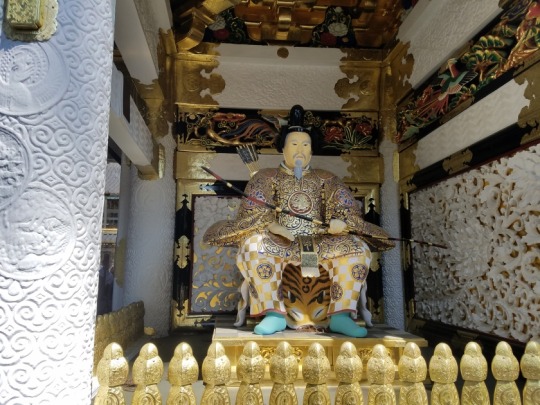
After his death, his son and grandson (Hidetada and Iemitsu) enlarged the shrine. Ieyasu is entombed there, which makes the shrine act as a mausoleum. He is also enshrined there, essentially deified in the Shinto faith, allowing the faithful and pilgrims from afar to come and worship him. His name at the shrine, for future reference, is Tosho Daigongen. Shinto has a history of deifying, or creating saints, all over Japan, most controversially in Yasukuni.
Notable Sights
The shrine is home to many impressive features but a few stand out from the rest in the large mountain complex.
Mizaru: The Three Wise Monkeys
Hear no evil, see no evil, speak no evil. This is a famous symbol present in both Chinese and Japanese culture and the depiction of the story at Toshogu is probably the most famous in all of Japan. It tells the story of a human’s life with the metaphor of the monkey going through its own life. Hear no evil, see no evil, speak no evil comes from the second panel and extolls the virtues of pure children who avoid evil during the springtime of their youth. There’s also a pun in the Japanese name: Mi (to look) and zaru (negative form) means “not to look,” like one of the monkeys, but zaru is also the word for monkey. Plus, the word Mi can also be used as a counting number for “three,” so there might be another layer there. Puns are appreciated across all languages here!
Yomeimon Gate and Karamon Gate

It’s big, it’s ellaborate, and it contains too many symbols and stories to capture in a single post. The one cool thing I liked was the reverse column, which was made becaus the architects and culture of the time believed that things made by man should never be perfect, thus, imperfections were engineered into their work. Just past Yoreimon Gate is Karamon Gate, which has some exquisite word carvings in its columns and bargeboard!
Main Shrine
This contains the remains of Ieyasu himself!
A beautiful bronze gate near the urn.
The tricky thing here is that there are no cameras allowed inside, as it is an active place of worship. The inside is very much like most Shinto shrines you’ll see across Japan, with lectures about the history of the shrine and its importance held somewhat frequently in the main hall. There is also a nice gift shop which has incredible ties with traditional Japanes patterning. They were, unfortunately, 5000 yen, which was outside my budget for that trip. One day!
Next Stop: Nikko
I also compiled a travel video for the Toshogu area on my YouTube channel for your viewing pleasure:
If you enjoy history and fine architecture of a more ornate style, Toshogu is definitely for you. You will have to pay a 1300 yen fee to enter the shrine grounds, but you can easily spend hours there. I recommend picking up the audio tour for 500 yen. ProTip: Get one and two people can share the earbuds and enjoy the information together!
Nikko Toshogu Shrine Nikko has a lot going for it: Beautiful nature, enjoyed in every season, and the great honor of being called the true Japan.
#Culture#history#Japan#Japan travel#Japanese history#Nikko#Nikko Toshogu#Nikko Toshogu Shrine#Shinto#Shinto shrine#shrine#Tokugawa Ieyasu#Toshogu Shrine
0 notes
Text
coincidence or fate?
So I was bored tonight, and instead of playing a game I decided to take a look at my family tree I was working on...
My sister is big into genealogy, she majored in historic preservation, and I’ve been working on my own version of our family tree to try and help kick open some dead ends. I’ve been using familysearch.org because it’s free and like ancestry if new info comes up that might match people on your tree it tags it for you to look at. So I first check our perpetual dead end (Fucking Lewis) and nothing new for him so I click on another, which has a new source on find-a-grave. On his page whoever filled it out added a ton of information, including his parents and with that information I was able to connect my tree to part of another member’s tree. So I start looking up the branches, and notice pictures on people from the 1600s and a pair of them died in 1621, in Plymouth...
That’s right we hit full Pilgrim, I call my sister in to check this shit out.
So I look down at their daughter, Priscillia Mullins, and with my sister’s urging click on her to read the history attached. Turns out she is part of a love triangle from the poem, “The Courtship of Miles Standish” by Henry Wadsworth Longfellow! My sister freaks out and tells me to google it, she wants to read it. So I do and... here’s where it gets weird.
I look and the wikipedia page for the poem had already been clicked, it said I had visited it 3 times, the last time being February 4th 2016... at first I can’t remember why, was it something from a podcast or tumblr, I vaguely remembered a painting or drawing being involved.
Then... I remembered.
It was reddit, on a subreddit I follow called thriftstorehauls. Someone bought a pencil drawing and was trying to identify the subject. So I googled Pilgrim, Courtship, and Spinning wheel and the poem came up. I also posted my findings to the thread for the op.
Now, I check reddit daily but between then and now, I’ve only posted 20 comments and all to gaming subreddits. I don’t know why at the time, I saw it and felt compelled to try and solve the mystery...
Something in my blood maybe.
2 notes
·
View notes